Taking charge
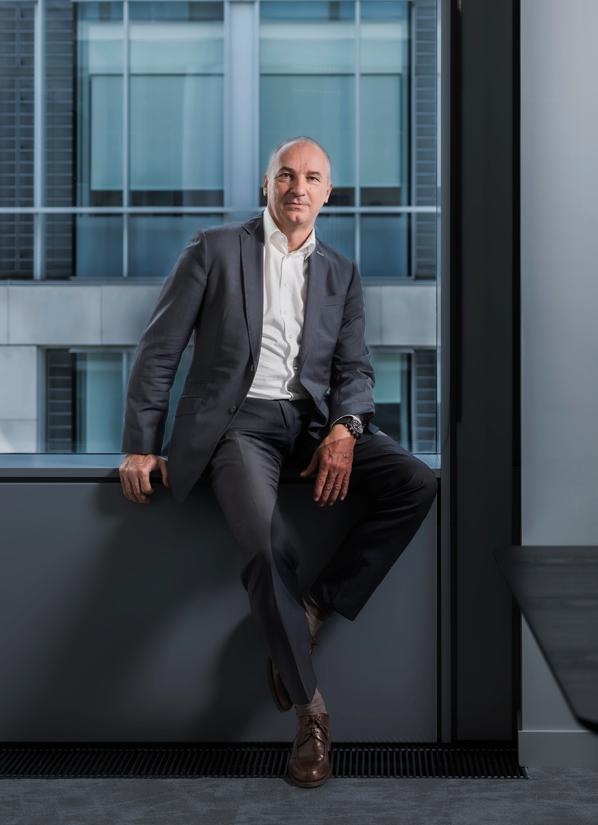
Brazil nuts
Regulator promises black market moves while politicians drop bombshells
Growing up responsibly
FanDuel’s Cory Fox on revolutionising player protection, banning sweeps and more


Regulator promises black market moves while politicians drop bombshells
FanDuel’s Cory Fox on revolutionising player protection, banning sweeps and more
Allwyn Group CEO Robert Chvatal on becoming a European superpower in lottery and iGaming
Also featuring: Casumo, Stake, Superbet, Totogaming and many more

















































































































































































































































Welcome to SBC Leaders’ Lisbon edition 2025! We loved welcoming the world to Lisbon last year for the SBC Summit and we can’t wait to do it all over again. Working in such a global industry is a real joy and this edition of the magazine reflects the global rendezvous in Lisbon with a series of features and interviews from around the world.
In this issue, we reflect on the first seven months of the world’s largest regulated market in Brazil and on the first seven years of regulated markets in the US.
FanDuel’s Public Policy Chief Cory Fox is refreshingly honest with his assessment of the state of play Stateside. “It’s certainly a little bit surprising to us that this is the way things have gone,” says Fox when asked about sweepstakes and prediction markets.
Seven years in and the US finds itself in a bit of a state of flux with the arrival of these new products that regulated operators fear to touch. The political machinations surrounding the Commodity Futures Trading Commission and the legal battles circling prediction markets reflect the political chaos surrounding almost everything President Trump turns his attention to.
Political chaos is tiring for everyone involved but it’s something that the gambling industry has to live with – from Washington DC to Brasilia and over to London, the Hague and Madrid, and even to Bangkok, as Joe Streeter points out on page 63. More than living with it, politics is something the industry has to manage. And it hasn’t always done it well.
But I’m not here to lecture. The SBC Summit is an opportunity to celebrate a truly remarkable industry that is continually evolving with new products, new technologies and new regions. In Lisbon, you will learn new things and meet new people. The magazine aims to reflect that global melting pot and I think it does. Check out Bragg’s thoughts on AI (p.80) or Rachael Kennedy’s excellent analysis of the spread of stablecoins (p.102) or Ted Menmuir’s article on the future of trading (p.44). It’s all here. Dive in!
Steve Hoare, Editor, SBC Leaders

The SBC Leaders Magazine is brought to you by SBC - Sports Betting Community: Editorial Team: Andrew McCarron, Craig Davies, Ted Menmuir, Joe Streeter, Conor Porter, Charlie Horner, Jessie Sale, Fernando Noodt Molins, Callum Williams, Viktor Kayed, Martyn Elliott, Lucia Gando, Jessica Welman, Ted Orme-Claye, Steve Hoare, Justin Byers, Kieran O’Connor, Christian Lee, Tom Nightingale, Elisa Marcante, Ana Maria Menezes, Rachael Kennedy, Ricardo Assis Sales Team: John Cook, Rasmus Sojmark, Alyona Gromova, Conall McCabe, Jan Kowalczyk, Camilla Scott, Bob McFarland, Craig Brown, Ed Young
Creative Lead | Design and Layout: Jessica Camilleri
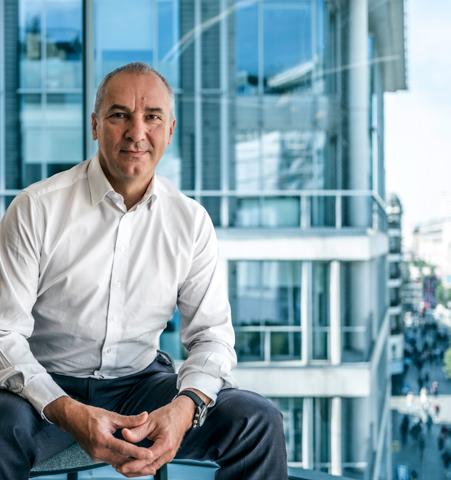
06 People
Casumo CTO Cristina Turbatu reflects on a life in gambling; plus Robeson Reeves dissects his new job at Intralot-Bally’s
13 The Hot Topic: Brazil takes off Brazil’s regulator defends a stormy start to the regulated market


FanDuel
16 Spotlight: Allwyn Group
CEO Robert Chvatal tells the story of how a small Czech lottery company took on the rest of Europe
36 Profile: Stakes are high
The female leaders in Stake’s Latam exec team tell a story of disruption
© 2025 Sports Betting Community Limited. All rights reserved.

120 Snapshot: Player behaviour in Eastern Europe
Optimove and SBC Advisory team up for in-depth data analysis
122 Final word: with Rasmus Sojmark
SBC Founder is getting excited about the legends match in Lisbon 36 Stake
All content in this publication, including articles, photographs, and other materials, is protected by copyright under the Copyright, Designs and Patents Act 1988. The copyright in all materials in this publication is owned by Sports Betting Community Limited or its licensors. You may not reproduce, distribute, or otherwise use any of the content without the express written permission of Sports Betting Community Limited (SBC), except as permitted by law. For permissions or licensing inquiries, please contact sales@sbcgaming.com.
The views in the publication are not necessarily the views of SBC or those of the advertisers. Although every effort has been made to ensure the accuracy of the information contained in this publication, SBC cannot be held responsible for any errors it may contain. In no event shall SBC be liable for any direct, indirect, incidental, special, consequential, or exemplary damages, including but not limited to, damages for loss of profits, goodwill, use, data, or other intangible losses (even if we have been advised of the possibility of such damages), resulting from the use or the inability to use the material contained in this publication.
Produced and published by Sports Betting Community Limited
REGISTERED ADDRESS: SBC, 2nd Floor, 212 New Kings Road, London, SW6 4NZ EMAIL: sales@sbcgaming.com | WEB: www.sbcgaming.com & www.sbcleaders.com
PLAYER PROTECTION
24 Interview:
FanDuel’s Cory Fox
Public policy chief on RG tools, the legality of sweeps and much more
28 Interview: Mike de Graaff of BetComply Compliance chief issues warning about EU Accessibility Act, DORA and AI Act
32 Interview: eyeDP CEO Warren Russell
CEO introduces us to the power of intelligent document processing
SPORTS BETTING
44 Feature: The art of sharp bookmaking
Anubis and Superbet extoll the virtues of trading over AI
48 Thought leadership: Rostyslav Likhtin of Data.bet
The modern practice of scraping is a race to the bottom, warns Data.bet product chief
52 Interview: Marek Suchar of Oddin.gg
Co-Founder explains how esports has become a core product for many and why it should be for everyone
56 Interview: STATSCORE CEO Dariusz Łęczyński
How to build a data provider with a difference
CASINO
64 Interview: Romania’s Totogaming
CEO and Deputy look forward to a clean slate after Romania’s regulatory crisis
68 Interview: Gamomat’s Iris Wallner
Composer gives the inside track on the creation of Dead Legion’s stunning soundtrack
72 Interview: Elantil
CEO Jonathan Gauci
Founder on the philosophy and growth of a unique platform provider
76 Interview: Edgelabs CEO Marina Rodov
On bringing its games to North America and beyond
80 Thought leadership: Bragg on AI
CEO and AI SVP have a vision for the future
84 Thought leadership: Soft2Bet CPO Yoel Zuckerberg Chief Product Officer showcases Ontario B2C launch as a case study in the art of localisation
88 Interview: Michael Bauer of Greentube
Chief Product & Revenue Officer delivers his view of North America’s nascent markets
92 Interview: Yuriy Muratov of 3Oaks Gaming
Chief Commercial Officer gives us the inside track on the emergence of a global supplier
96 Interview: Michael Oziransky of Vegangster
CPO delivers vision for a brave new world of casino lobbies PAYMENTS
102 Feature: The Stablecoin wars
Expert analysis on the adoption and infrastructure of stablecoins
106 Thought leadership: Elton Dimech of Payhound
MD looks into the evolution and future of crypto
MARKETING
112 Feature: Brazil’s new restrictions
An in-depth look at the impact of marketing restrictions being proposed in Brazil
116 Guide: SBC events 2026
As you plan your marketing budget for next year, here’s all you need to know
Casumo, 2024–PRESENT
“Taking the CTO role at Casumo was a big step and a tough introduction. Within a month of joining, I had to make some difficult decisions, including restructuring parts of the business and downsizing my team.
The support from the CEO, COO and CFO was invaluable — they helped me adjust to the scale and complexity of the business quickly. Managing B2C specific financial metrics and aligning them with technical strategy was a steep learning curve coming from a B2B environment.”
BeyondPlay, 2022–24
“Joining BeyondPlay was a return to startup life — building from the ground up. I was one of the first
three hires, so I had to wear multiple hats and work closely with founder Karolina Pelc to bring the product vision to life.
The idea of social and multiplayer betting was new, and developing the technical framework for this was challenging but rewarding.”
Playtech, 2016–22
“Playtech was where I really sharpened my strategic thinking. I joined the Innovation Lab, which reported directly to the C-level. This gave me a unique view across all business verticals — casino, sportsbook, and bingo. We weren’t just developing products; we were solving business problems.”
Odobo, 2013–16
“Odobo was my first experience in a startup — and my first major turning point. I started as a test automation engineer, but that changed after I fixed a bug that had blocked one of the applications from running after a new release. The CTO Peter Mares saw my potential and insisted I become a developer. He became my mentor and showed me the roadmap to becoming a CTO.”
Victor Chandler, 2012–13
“Victor Chandler was my introduction to the gambling industry and a total culture shock. Coming from Romania, where gambling was seen negatively, it was strange to see betting as a form of entertainment, in which I remember seeing people having fun by betting on the Queen’s hat colours!
I knew nothing about sports betting, so I had to adapt quickly. One of the biggest challenges was managing scalability and availability during peak events — back then, everything was still on-platform, so we had to find creative ways to test system limits.
I remember one night when we manually opened up every computer in the office to run automation scripts and simulate high traffic.
I remember a company betting pool during the Cheltenham Festival — I picked horses based on funny names and bright colours, and somehow kept winning. The trading team kept asking how I did it. I just replied ‘the horses have funny names!’”


“While I was at Playtech, I started a non-profit –Girls in Tech – in Gibraltar, focused on community projects. It was a different kind of leadership — more about motivating people around a shared purpose.
Spending as much time with my family and close friends is the best way for me to relax and recharge, as it’s important to step away from business.
I enjoy watching movies, reading books or articles on tech and current affairs, which helps me put things in perspective. Lately I’ve gotten into spinning classes… Sometimes I focus on activities that engage me emotionally. Other times, I like to explore ideas or areas where I can be creative and learn something new… you never know where time off can lead you to.”

LeoVegas Group CEO Gustaf Hagman has stepped down from his role, 14 years after co-founding the casino-first operator. He has replaced by Mattias Wedar, the firm’s Chief Product and Technology Officer (CPTO).
Ex-NFL VP for Public Policy & Legislative Affairs Jonathan Nabavi has joined FanDuel in the newly created role of VP for Federal Affairs.
Flutter Brazil has recruited former Diageo exec Álvaro Garcia as its new Chief Marketing Officer.
Kambi has appointed former Sportradar exec Mateo Lenoble as head of sales in Latin America.
George Daskalakis, CEO of Betano parent firm Kaizen Gaming, is stepping down as Stoiximan CEO, 13 years after establishing the Greek and Cypriot operator. Managing director Nikos Fligos steps up as CEO. Kaizen’s Chief People Officer Stella Voulgaraki has stepped down from her role after three years.
Yolo Entertainment has appointed former Betway Commercial Development Officer Stephanie Eddy as Chief Revenue Officer.
PlayStar has appointed Fredrik Liljewall as its new CEO to replace Peter Ekmark, who stepped down in June.
Abelson Sports has appointed former Sky Bet veterans Mikey Mumford and Richard Evison as senior football traders.
ZEAL Network has named Stefan Tweraser as its new CEO, with the ex-Google head due to replace Helmut Becker.
ROBESON REEVES was announced as the Chief Executive Officer of the new Intralot-Bally’s international business after the US casino operator agreed the sale of its international interactive division to the Greek lottery supplier at the beginning of July. On the day of the announcement, he spoke exclusively to SBC News
Words by TED MENMUIR
The man of the moment and 20-year executive of Gamesys Group and Bally’s Interactive will lead the £2.7bn tie-up of a new B2B and B2C giant, which aims to expand its presence across all continents.
Taking the spotlight at this year’s biggest gambling M&A thus far, Reeves noted: “It’s an amazing transaction—for the good of Bally’s, the good of Intralot. It makes us very unique, bringing iLottery and iGaming together with tech, data and global reach that no one else has.”
The deal notes underscored Bally’s and Intralot’s shared history and investor profile. However, with Intralot’s competitors IGT and Scientific Games recently splitting casino and lottery arms, the union of two distinct companies with contrasting operating models and divergent technology stacks has raised eyebrows.
The strategic logic of Bally’s-and-Intralot is not as instantly visible as other deals that have preceded it in the gambling sector’s everconstant M&A scene. Yet Reeves says this is ultimately a merger of two very tech savvy and financially sound businesses that can forge ahead in changing B2B and B2C climates.
“We like our profile, huge cash flow, rapidly de-levering, and additive to both our lottery and gaming capabilities. In FY24 alone, the combined entity generated €416m in EBITDA, with over 90 per cent free cash flow conversion. That kind of strength gives us flexibility to pursue growth – including M&A – in a disciplined way.”

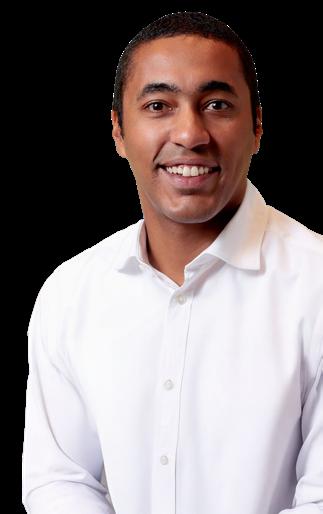


“
We now have the flexibility to pursue M&A, but I’ll always play to my strengths: tech, data, and product. We’re not chasing scale for the sake of it

Cash generation aside, the deal notes did not fully capture the commercial upside of combining and upgrading each company’s existing contracts and exclusive content partnerships. Reeves pointed to the dynamism of the combined business - blending Bally’s IP-rich consumer-facing brands with Intralot’s embedded position in government-licensed markets.
He says the commercial visibility of the deal will soon be clear for all to see: “Just this week, Hasbro announced we now hold the global rights to the Monopoly brand for use in all regulated gaming territories.”
“It’s perhaps the most global local brand there is, and it sits alongside a portfolio that can now benefit from Intralot’s operational presence in 14 more countries than us.”
As such Reeves notes that the merger is not simply a scale play, but a strategic combination of two businesses that broadens market access and unlocks new cross-channel opportunities in both lottery and gaming sectors.
There is no hiding Bally’s–Intralot’s ambition to become the most dominant technology supplier to North American lotteries.
The merger positions the new group to challenge incumbents just as the traditional lottery supply chain undergoes disruption. In recent months, sector giants such as IGT and Scientific Games have restructured or spun out digital and retail divisions, creating what Reeves calls “a window of realignment” in lottery services.
“We’re adding to Intralot’s business, while others are going through significant change,” he noted.
“Things are shifting rapidly in the lottery space. This gives us an edge.”
Reeves is realistic about the competitive dynamics of North American lotteries. He acknowledges that US lottery contracts are typically renewed by incumbents, making them hard to penetrate.
Yet he believes the stability of existing contracts – €1.4bn in revenue secured through 2029 – gives the group reliable EBITDA, and that recent controversies
in key markets (notably Texas, which banned lottery courier services such as DraftKings’ Jackpocket Lottery) will spark a rethink in how public contracts are structured and awarded.
“Even in a worst-case scenario where incumbents are renewed, that still means robust, almost locked-in earnings. But the ground is shifting - and we’re ready.
“If you look at what’s happened in Texas – the scandal and the scrutiny around how that lottery contract was handled – it raises serious questions about whether the structure of these contracts needs to be reconsidered.
“There’s a growing awareness that long-standing renewals and lack of competition may not be serving the public interest. That creates an opening, and we’re well-positioned to respond if reform comes.”
As the newly combined Bally’s–Intralot business takes shape, Robeson Reeves’ outlook is defined by discipline, not haste.
When asked about M&A appetite, Reeves was quick to frame the group’s approach to deal-making: “We now have the flexibility to pursue M&A, but I’ll always play to my strengths: tech, data, and product. We’re not chasing scale for the sake of it.”
Instead, he points to methodical international growth. The group expects to enter one to two new iGaming markets per year, using Intralot’s local footprint and Bally’s technology to move quickly where regulatory doors open. “It’s about expanding the platform in a smart, organic way - adding value without overextending,” Reeves noted.
Behind the scenes, a new executive leadership team will be finalised by the end of the year, as the group formalises its structure, brand, and strategic roadmap.
For Reeves, who has weathered two decades of change in digital gambling, the ambition is clear — but so is the restraint.
“We’ve shown consistency, adaptability and regulatory resilience. That’s why we’re the company to watch.”
















































SBC Noticias Brasil Editor Ricardo Assis gets the inside track from the technical department at the Brazilian regulator and looks back at a turbulent first six months
Seven months after the regulation of sports betting in Brazil, the dust is finally starting to settle. We’re beginning to get a clearer picture of the market’s size, who’s here to stay, and we can begin to outline a path forward.
There have been many challenges, ranging from adapting to a regulated market to dealing with Brazil’s legal uncertainty. During a panel at the SBC Summit Americas, Luiz Felipe Maia, partner at Maia Yoshiyasu Advogados, summed it up well: “We could say these four months of regulated market felt like four minutes - except underwater, with everyone trying to survive and adapt to operating in Brazil.”
At the time of writing, the regulated market included 76 companies operating under 173 brands. In addition, two other companies are operating six brands under judicial authorization.
Despite the positives of the newly regulated market, one issue continues to concern both operators and regulators: the illegal market. According to a spokesperson for the technical team at the Secretariat of Prizes and Betting (SPA), illegal operators’ activity is decreasing but they acknowledge that it is an issue that requires attention.
In an interview given in early July, Secretary of Prizes and Betting Regis Dudena seemed to have his head stuck in the sand, when he told SBC Noticias Brasil the trend is toward channeling bettors into licensed companies, resulting in greater transparency, security, and responsibility.
“If we compare it to how things were up until last December, when there weren’t many criteria for this [regulation], to now, we can clearly say this: today, we have a much larger number of people enjoying entertainment in a regulated environment [with] authorized and legal operators,” he said.
Now, the SPA spokesperson highlights the importance of the Technical Cooperation Agreements (ACTs) signed in recent months, aimed at strengthening enforcement, security, and the integrity of the regulated market: “Key partners include ANATEL (for blocking illegal sites), COAF (anti–money laundering), and Senacon (consumer protection). These partnerships have enabled the sharing of strategic data and institutional coordination, enhancing the effectiveness of regulatory and enforcement actions against the illegal market.”
At the end of May, the first suspensions and precautionary measures against licensed operators were announced. On that occasion, seven companies were suspended for failing to submit security assessment reports for their betting systems.
The spokesperson for the SPA’s technical team states: “Monitoring and enforcement are ongoing activities for SPA in the fixed-odds betting sector. The focus is on two main fronts: fighting the illegal market and overseeing authorized companies that may breach regulations.”
With the critical first six months behind us, international experience suggests that market consolidation is on the horizon. By the end of 2024, we had already seen initial moves, such as the merger between Betmais and Casa de Apostas, two local operators that shared the same technology supplier.
The most notable deal was Flutter’s acquisition of 56 per cent of Betnacionalone of Brazil’s largest operators - for $350m.
The number of new licence applications is decreasing, says the tech team spokesperson.
Another issue of concern has been the lack of official data. Seven months have passed and we still don’t have official tax and revenue figures from the Ministry of Finance.
The SPA spokesperson says that total revenue in the first six months of 2025 was around R$3.8bn (US$680m). “It is not possible to make tax revenue estimates by specific economic segment,” they add.
The SPA collected around R$2.2bn (US$400m) from authorization grants paid by fixed-odds betting operators, and around R$50m (US$9m) from oversight fees also paid by betting companies.
The delay in publishing official figures has damaged the image of the regulated market at a time when it is under attack from both opposition and government allies. The government could counter criticism by pointing to tax income, which is perhaps a more tangible benefit for politicians than the consumer protection benefits of regulated gaming.
One persistent concern for all operators – and most companies doing business in Brazil – is the lack of legal certainty. This is an issue beyond SPA’s control and depends on political agreements.
In the first six months of 2025, there were two major political moves that could significantly impact the betting market. In May, the Federal Senate approved a bill, which limits advertising for fixedodds betting. Among the restrictions is a ban on ads or promotional actions involving athletes, artists, media figures, influencers, or public authorities.
In June, the Ministry of Finance announced a measure to increase the gross gaming revenue (GGR) tax on online betting from 12 per cent to 18 per cent.
Such moves erode the faith of investors and reduce the competitiveness of the regulated market.
For Alexandre Fonseca, CEO of Superbet Brasil, the proposed advertising restrictions risk “weakening much of the fully regulated operators while facilitating the operations and expansion of the illegal market”.
Marcos Sabiá, CEO of Galera Bet, adds: “If the goal is to boost revenue, the most efficient and effective measure would be to relentlessly crack down on the illegal betting market. This alone could double tax collection in the sector, not to mention the broader benefits of eliminating an underground market that evades taxes and engages in various illegal practices that harm society.”
It’s still too early for definitive answers but there are more positive signs than negative ones. In just six months, tax revenue from the sector jumped from R$9m to R$3.8bn, and we’ve also seen the market mature in implementing responsible gambling policies - now widely present in advertising campaigns.
Looking ahead, what’s most needed is patience. Patience to let the market operate and mature, patience to watch the development of responsible gambling policies and the evolution of the Brazilian bettor. After all, this is the first time in nearly 80 years that gambling is legal in Brazil, and building a gambling culture takes time.
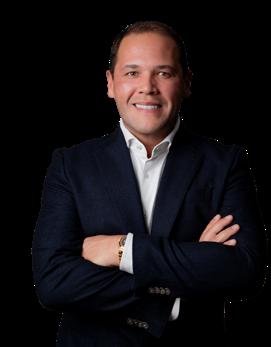

Allwyn Group’s long-serving CEO ROBERT CHVATAL explains how the philosophy of Chairman Karel Komárek is changing Europe’s lottery landscape and, arguably, the iGaming and sports betting industry too
Words by STEVE HOARE
The day before SBC Leaders meets Allwyn Group CEO Robert Chvatal at the company’s London office, the company was announced as the winner of the race to operate the Italian national lottery.
Allwyn retained the contract together with technology partner IGT but faced fierce competition from Flutter’s newlyacquired Sisal and others. It means that Allwyn continues as the lottery operator of choice for Austria, the Czech Republic, Greece and Cyprus, Italy and the UK. In recent years it has also acquired significant stakes in two of Europe’s fastest-growing private gaming operators, Novibet and Kaizen Gaming.
In recent years, along with Flutter, it has emerged as the most acquisitive company in the betting and gaming industry. It has also proved itself to be a superbly professional bidder for the big contracts, following the Italian deal and its ousting of Camelot as the UK lottery operator.
“We are in six European jurisdictions now. So I think we have a reason to claim we know what works and what are the best practices for European lotteries,” says Chvatal. “We have a good team running our bids but we also know how any national lottery can be run better and in a more contemporary way.”
Chvatal does not do false modesty. But neither is he boastful. After 12 years at the helm, he exudes confidence. At the end of his first year as CEO of Sazka Group – the company name before it was rebranded as Allwyn – net revenue was €161.7m. Ten years on that figure is up 2,420 per cent to €4.03bn (see chart).
“The story of Allwyn Group is a story of both organic growth, i.e. what we operate as an installed footprint, but also of inorganic growth,” says Chvatal.
During the second half of Chvatal’s period in charge, the lottery operator expanded into the betting and gaming space. Its first non-lottery investment in 2018 was a 37 per cent stake in Greece’s Stoiximan, which went on to become Kaizen Gaming in 2020, now known more widely as the parent company of the all-conquering Betano brand.
“Originally, that was about cementing our position in the Greek market,” explains Chvatal, where the company owns majority stakes in lottery operator OPAP and (now) Novibet, as well as a minority stake in Kaizen. “Stoiximan is an undisputed market leader in sports betting in Greece. Simply for us, it was a case of making sure that we are an undisputed gaming and lottery market leader in Greece.”
“The expansion of Kaizen/Betano in the rest of the world is another story,” continues Chvatal, pointing out that this is a standalone investment, where Allwyn is a minority shareholder with little influence over day-to-day operations. “I would differentiate between Greece, which is our market where the lottery is, and the rest of the world where we might not have any lottery – like, for example, Brazil. It’s an emerging market. It’s a big market. So, we all benefit as a shareholder in this growth.”
The 51 per cent stake in Novibet –another Greek-based sports betting and gaming operator – is a bit different.
“We believe that there’s a lot of dynamism and innovation in more of a real-time experience for the consumer,” explains Chvatal. “This expertise and their capabilities in general are helpful for running any sort of betting and gaming business, including lottery.”
“So our 51 per cent stake in Novibet is an acquisition of technology as well as skillset,” he concludes.
Chvatal says that, in theory, Allwyn could deploy the Novibet tech stack in other markets where it runs sports betting and iGaming operations. However, this will not serve as a lottery platform.
“In some other markets, we use our own technology – in Austria, for example. So in Austria, we run our own tech stack both for retail as well as online. And we always have to compare: is this technology enabling us to be a better lottery? Is it an accelerator or a burden?”
In other jurisdictions it has preferred to rent the expertise. In the UK, for example, it relies on Scientific Games and in Italy its technology partner is IGT.
When Chvatal joined Sazka Group in 2013, such questions were far in the future. The new CEO had spent 15 years in the telecoms industry, latterly as CEO of T-Mobile, Austria.
“Mobile telephony was one of the things that profoundly changed how people work and play. But by that stage it had drifted from being a shaper of the new world towards being a utility company. People care about whether the pipes are working but they don’t really care about the networks. They care about the phone they have and the apps they have on it.”
At this point Chvatal met fellow Czech Karel Komárek, whose family fund KKCG had just acquired the national lottery Sazka from the Czech government. Komárek is a serial entrepreneur, one of the country’s most successful and wealthiest businessmen.
Chvatal immediately recognised Komárek as somebody who could transform this “miserably run,
underperforming lottery” into a modern gaming company.
“Because of you, I told him, I believe we can change how Sazka is run. We will have to instill the belief in the consumers that this is an interesting and entertaining experience. Because we offer games – and games are played – by definition, the whole experience has to be playful/entertaining rather than transactional. And the second thing is – because the digital channel didn’t exist at all back then – I said, we have to brutally digitize it.”
Komárek responded: “I like it. Let’s try it.”
Over the ensuing years they did just that. Along with the modernisation of the Czech lottery came the realisation that they could replicate the process with other under-performing national lotteries. So, when the Greek government was forced into selling 33 per cent of its national lottery OPAP, Sazka (initially in partnership with EMMA Delta) leapt at the opportunity. It has since increased its stake to 51 per cent.
“In Austria, the shareholders were insurance companies. They didn’t know what to do with the lottery. In the UK, the third licence expired and it was finally time to create a true competition for the fourth licence. Camelot was a one trick pony. If they had continued with Camelot it would just have been more of the same.”
The UK is a slightly different animal to the others. It already reaps 49 per cent of its revenue from digital products, which is quite high compared to the 39 per cent across Allwyn Group. In Italy, there is a real opportunity, where digital revenue is only around 10 per cent of the whole.

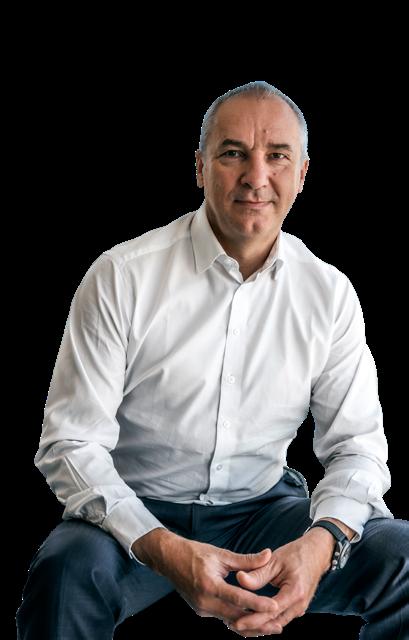
We always have to compare: is this technology enabling us to be a better lottery? Is it an accelerator or a burden?
“
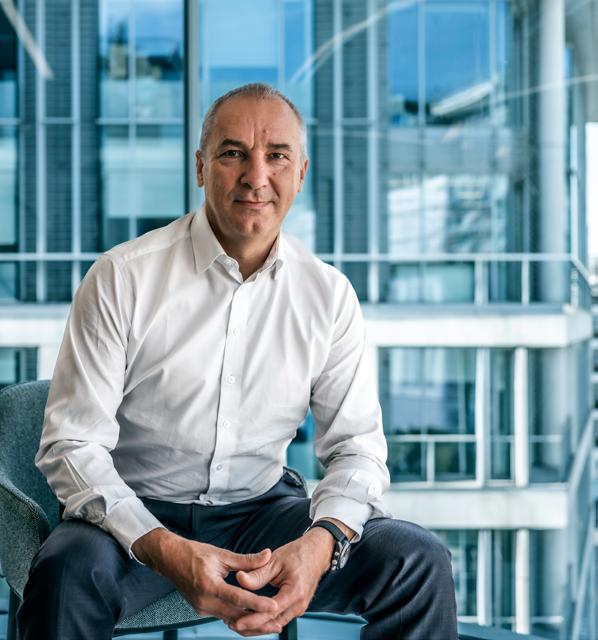
“You would hope to increase your margin with digitization but it’s not the primary motivation to digitize. You have to digitize a lottery to stay relevant to the new and next generations of customers. Young people tend to live on their smartphones more than their parents who were buying lottery tickets in retail outlets.”
Ultimately, Chvatal is confident that the company can boost the UK’s national lottery – and crucially, its contribution to good causes – as much as it has done elsewhere.
Shortly after Chvatal joined Sazka, Stepan Dlouhy joined KKCG as Investment Director. He would go on to become Allwyn’s Chief Investment Officer, leading the company’s dedicated M&A team.
Together with Chvatal and Komárek, Dlouhy has been a key figure in transforming Sazka from a completely lottery-led company into the modern lottery/sports betting/iGaming conglomerate that Allwyn Group is today. Chvatal highlights this diversification as a key inflection point in the company’s journey and an obvious pointer towards its future.
The deal-doing will continue. (“Karel loves a deal,” says Chvatal at one point, “like Trump!”) But there was one deal that Komárek did not like, when three years ago, he called off a potential listing on the New York Stock Exchange via a Spac, which did not value the company in line with his expectations.
“We are clearly listable or IPOable,” says Chvatal. “We have a track record. We have quite a longterm established presence in capital markets because we finance ourselves also by issuing bonds. So we are on the debt side of capital markets but not on the equity side. But this means you are exposed to the same investors.”
Chvatal seems happy not to have to explain himself to investors every quarter and he believes being private gives you a little extra flexibility. A future IPO will come down to timing. Are the market conditions right? Do the benefits of being listed outweigh the benefits of being private?
“Even if we were to get listed, I think we would like to keep control, so we would not go and sell the whole company. As long as Karel has a belief and an appetite that he can still improve Allwyn – and I believe he definitely does – then we will continue as at least a partially private company.”
In the Czech Republic, Komárek is almost as well known for his philanthropy as he is for his businesses. The key to understanding him is that he likes to improve how the world is run as well as its businesses, says Chvatal. And he looks to the long-term.
That is reflected in his care towards his employees and in his insistence on furnishing the company’s offices more like a hotel than a traditional office. (Allwyn’s London office in Soho has the nicest office toilets this journalist has ever visited and also poured his favourite brand of organic tea!)

In the Czech Republic, Komárek is almost as well known for his philanthropy as he is for his businesses “

“We take pride in hand-picking the management teams of every single company that we have,” Chvatal continues. “Even if we continue to work with the founders of companies we acquire like in the case of IWG. We might say ‘Look, maybe you need to recruit in certain areas to complement your own strengths and build a more cohesive management team’.”
To summarise his own attitude, Chvatal concludes: “You must always accept change,
never give up, and show you care – show you care not only about responsible gaming but show you care about the industry and the sector and that you believe you can always push it onto the next level.”
On a philosophical level, one senses that Chvatal and Komárek are very much aligned. The Allwyn growth story is far from finished.
ON THE FOLLOWING PAGES
24 Interview: FanDuel’s Cory Fox
28 Interview: Mike de Graaff of BetComply
32 Interview: eyeDP CEO Warren Russell
Player Protection Hub Editor Steve Hoare believes the online gambling industry can win in the court of public opinion with the emergence of a truly responsible gambling culture

It is, perhaps, ironic that the country with one of the most lax approaches to responsible gambling (at a regulatory level) could be among those tackling it best.
I’m talking about the US. During the past two years the online industry has powered the cause of responsible gambling on to new heights.
While the lottery industry has quietly started to ramp up its RG efforts – it goes with the non-profit, government-owned territory –generally speaking, commercial casinos have lagged behind.
“The standard in many retail or commercial casinos seems to be to wait for a customer to verbally express signs of a severe problem and then hopefully someone’s going to hand them a brochure and tell them about the helpline,” says Consultant and Former National Council of Problem Gambling (NCPG) chief Keith Whyte.
He goes on to point out that Caesars stands apart from the crowd with a strong record of training its employees across departments.
“But most people with gambling problems I have talked to report
that they never had positive interactions with retail casino staff,” continues Whyte, “even if they were in desperate straits and exhibiting all sorts of signs and specific behaviours, asking for help.”
It is no coincidence that the architect of Caesars’ marketleading RG efforts, Jennifer Shatley has re-emerged as President of the Responsible Online Gaming Association (ROGA).
ROGA’s early track record is good – although Caesars’ absence is notable. Its guidelines on VIP schemes, for example, are not perfect but they are a strong baseline for operators tackling a tricky subject. Next up, will be some guidelines for responsible marketing.
The early signs are that ROGA might succeed where the UK’s Senet Group largely failed. It might have something to do with branding – call a spade a spade – but the UK public largely met the Senet Group with cynicism, before it was absorbed into the Betting & Gaming Council.
Shatley’s professionalism and track record should also go a long way towards fulfilling ROGA’s potential.
While the $20m that FanDuel, DraftKings et al pumped into ROGA is far from insignificant, what is more significant is the launch of each operator’s own tools and the emergence of a culture of RG that the land-based industry has never really embraced.
Shatley recently told me about “a shift from a problem-focused
approach to a player-focused approach”. This is most evident in tools such as FanDuel’s MySpend and RG Check-in and DraftKings’ My Stat Sheet. These are personalised tools that foster a responsible attitude to gambling in every player that uses them. You can read more about FanDuel’s efforts in this area over the page in an interview with the operator’s engaging SVP of Public Policy & Sustainability Cory Fox.
The key here is going above and beyond regulatory requirements. The public, politicians and mainstream media are fully aware of the rise and rise of sports betting, and will gleefully latch on to anything that shows an accompanying rise in problem gambling.
However, the key finding from the NCPG’s third National Survey on Gambling Attitudes and Gambling Experiences conducted in April 2024, was that levels of problematic play have returned to the levels seen in 2018.
That they have done so, is thanks largely to an emerging culture of RG that bodes well for the future of the US online industry.


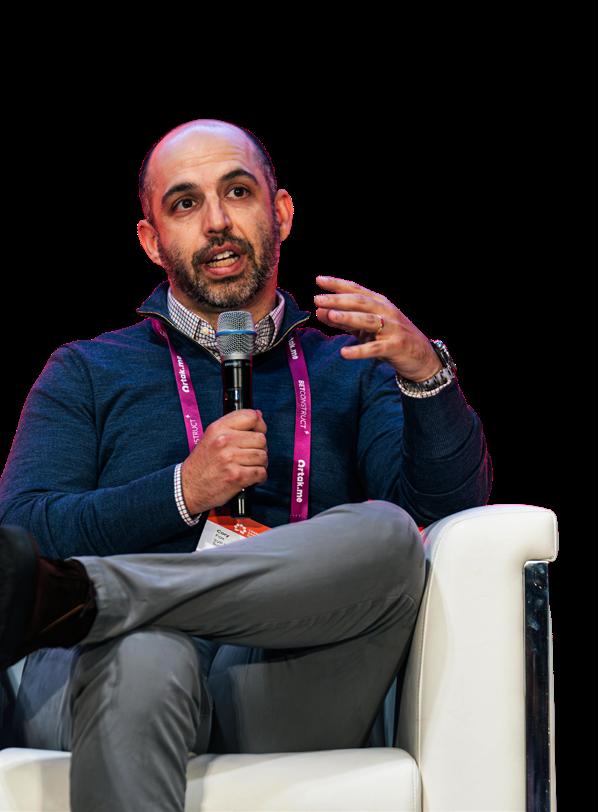

Interviewed by STEVE HOARE
You’ve just launched RG Check-in, and you’ve had My Spend going for a while. What have been your observations around the data and experiences you’ve had coming out of that?
I think we are now embarking on a new generation of tools that are much more integrated right into the customer experience, which we think will be more effective for our users, and we will get greater engagement from our users.
Last year we launched My Spend, which gives users personalised insights into their play right within the flow of the actual app without us having to surface it to them proactively. So they don’t have to go and click around in menus in order to find their play history and figure it out for themselves. We found incredible engagement with that. Over half of our active users used it during the NFL season.
So we were really pleased with that response. And so we took from that: if you include the tools right in the product and you give users personalised insights, they really appreciate that and want to engage with it. Then they understand their play better.
So when we saw that we had a lot of success with that and that we can build on that and that led to real-time check-in.
So tell me about real-time check-in. It feels like a progression.
Yeah. Absolutely. So real-time check-in is this: using artificial intelligence to create for every user for each day a predictive deposit amount based on that individual user’s history. And when a user goes
to deposit significantly more than that amount that we predicted they would deposit, they get a little pop-up that says, ‘this is more than you usually deposit. You should consider lowering the amount or setting a deposit limit.’
I think our customer research suggests that users really appreciate that, and I think they appreciate it because it’s built right in and it is specific to them. So they feel like we are giving them useful information right in the flow.
And then there’s a phase of that product, which is if it’s even more – related to the proportion of what we expected they would deposit – they are prompted to lower the amount or set a deposit limit, and they are required to. They can go forward with the original amount, but they’ll be required to set a deposit limit afterwards.
With all the data we have at hand and with AI and the way the technology is moving, can you see a future where you can foolproof your own operation, so that players can’t get into trouble? It doesn’t stop them going elsewhere, of course, but…
There are certainly challenges. In part because what addiction looks like for each user can be a little bit different, both in terms of what an uncomfortable level of play from the monetary standpoint is, which obviously varies greatly across different users on the platform, but also, sometimes it’s not about money. Sometimes it’s about them spending too much time on the platform, and that’s interfering in their life. And so trying to identify what is problematic at the user level is not easy. But I do think we have a greater set of tools than we’ve ever had before, and we’re going down that path.
“ It’s certainly a little bit surprising to us that this is the way things have gone with events contracts regulated by the CFTC

Let’s turn to the public policy side of your job. It feels like the political climate around the gambling industry Stateside has gone haywire. Everyone’s running scared of new technologies. There’s casino operators fighting sweepstakes operators, land-based operators and unions fighting the online people, online people fighting the DFS 2.0 people. What’s the way out?
The way out is to have a level playing field. And so what we need more than anything is for state regulators and state attorney generals to make it clear which of these products are legal within their jurisdictions, and then we can compete amongst each other with clearly legal products.
The challenge is when it is unclear what’s legal, and then I think that leads to a lot of the consternation that you described. But I think what we need is a level playing field where we can compete knowing
what the rules of the road are. And as we’ve been discussing, regardless of which of these products are going to be legal, we need appropriate player protections in place for all of them.
Interestingly, you’re only talking about state governments but there’s an issue here when you’ve got the CFTC - a federal institution - regulating predictions contracts, which is a competing gambling product, potentially in states that don’t regulate sports betting, for example. Is that sustainable having one product regulated on a federal level and another competing product regulated on a state level?
It’s certainly a little bit surprising to us that this is the way things have gone. I think largely what’s critical to us is to see that same legal clarity and to understand what the parameters are of the markets that can be offered via event contracts regulated by the CFTC.
We are watching closely as the states are making their opinions known about that, and we’re a regulated operator across many different jurisdictions. And so, certainly, we want the end result to be, again, a level playing field where we all agree on what the rules of the road are and are respectful of each of those states’ regulatory regimes.
It’s almost anathema to talk about this, but, do you see a future where there is more federal oversight of gambling? With the CFTC and the SAFE BET Act it almost looks like it’s going that way.
Look, we think, by and large, our state regulators are doing a very good job of regulating the industry. But this has become a successful industry that many people are exposed to via a lot of national television advertising. And so there is interest in it, from sort of across the spectrum at the federal level.

But I think in the end, gambling has been and will continue to be effectively regulated at the state level. But it’s also on the state regulators, the operators, the entire ecosystem to ensure that at its core users are properly protected, and in order to ensure that the current system can continue.
You talked very eloquently about states making it clear what is legal and and what’s not legal. And I think that’s a very fair point. Ultimately, I’m sure you’d also like more states to make online casino legal, for example, and sports betting in more states, of course. But legislatures seem to have ground to a halt on that front. I think it’s maybe hard for them to know what to do when, as I pointed out, everyone’s throwing different arguments at them.
It certainly has been a choppy period in the industry, but, I do think the best way to ensure that their states’ gamblers are protected is to do the two-step of enforcing against the illegal operators, including the sweeps casinos that are operating in many jurisdictions around the country. We’re starting to see some momentum in shutting them down in at least some jurisdictions.
And then also setting up a legal and regulated iGaming market in their state. I think by doing both of those, users will have access to the right player protections, as well as entertainment sources.

And so, that’s the best way because while I’m heartened to see that some states are taking action against the sweeps operators, the illegal market will continue to exist. And it’s unfortunately something of a game of whack-a-mole with the way the internet works.
I view that one slightly differently. I think you – the regulated industry – could have embraced the sweepstakes operators and said, ‘look at this lovely legal product. Why don’t we do online casino as well?’
Look... in my previous job, I was product advisory at FanDuel, which meant that when product and engineering wanted to build something new, they came to my team and said, ‘are we allowed to do that?’
And with sweeps, with some so-called fantasy sports business models, all of those things – commercial was interested. They saw these other operators out there with products that customers liked, frankly, and were getting traction, but we just could not get comfortable that they were legal.
We could not say with a straight face that they’re legal. And as regulated operators, we couldn’t go there. So the issue is that the legal analysis just didn’t come back that way.
Words by CHARLIE
The implementation of the EU’s Accessibility Act, DORA and AI Act can have significant ramifications for iGaming. BetComply’s MIKE DE GRAAFF advises companies how they can remain compliant and profitable
Operating in highly regulated markets is never an easy feat. But things in the European Union got significantly more challenging over the summer. Three new laws have come into effect that impact multiple disciplines across the iGaming industry.
The EU Accessibility Act, the Digital Operational Resilience Act and the AI Act all came into force in 2025, meaning that companies’ user interfaces, cybersecurity and AI capabilities must be reviewed. Websites must now be accessible for all with disabilities, while DORA maintains that besides operators, which are subject to ISO standards, payment institutions must have robust cybersecurity mechanisms as well.
One could tackle these challenges using AI, but the EU is now regulating how companies can use that as well.
Navigating each of these pieces of legislation is a challenge alone, but adjusting to all three might seem an impossible task.
“These three acts are specialisations. Accessibility is a specialisation on its own, cybersecurity on its own, AI on its own, and then the regulatory challenges on their own as well,” says Mike De Graaff, Chief Compliance Officer at BetComply. “It’s not like one super genius that works in-house can solve all of these, because they simply can’t.”
De Graaff outlines that operators simply are not ready for these changes, adding that very few have the in-house capabilities to adjust to such legal evolution simultaneously.
One may be forgiven for thinking about consulting a lawyer about this. But De Graaff warns that this is definitely not the right approach as it will be a very expensive and ultimately futile endeavour.
“Going straight to a lawyer racks up bills, and they only explain the law. You still have no practical implementation, so you then need to go to compliance or IT specialists with whatever the lawyer produced in terms of superexpensive guidance.”
It’s tough to strike a balance between maintaining compliance with the three acts and still having a profitable business at the end of it. But shying away from the challenge will only make things more expensive in the long run, says De Graaff, who explains that this is a moment when operators should be considering major platform upgrades.
“You’re going to get a patchwork platform and operations that are super-expensive, sluggish, and no one knows what the hell is going on inside the platform anymore. I think you should be using this as an exercise to do a complete platform overhaul at once, and then redesign it from the ground up.”

You should be using this as an exercise to do a complete platform overhaul “
Trying to wiggle through it and try to make money non-compliantly in the regulated market is a death sentence
BetComply, as a compliance consultancy firm, is ready to support companies who will need to adjust to these measures imminently. Even with the EU Accessibility Act, which has a five -year grace period, operators will have to immediately comply upon any major upgrade to their websites or when launching new ones.
The consultancy has a whole team of experts in-house who can support companies through these choppy waters, even if this is a completely new challenge.
De Graaff explains: “There is no firm out there that has multi-year experience of doing this, because these acts are brand new. We have regulatory compliance experts in-house. We have technical compliance with legal experts. We have mental health care experts in-house, addiction care experts in-house, legal financial experts in-house.”
The firm aims to be a one-stop shop solution for any compliance challenge. In this specific context, BetComply has in-house capabilities for around 80-90 per cent of the challenges.
As De Graaff adds: “You can go to a law firm. You will get legal advice. You can go to a compliance company. Most of the time they’re just regulatory compliance and bound by jurisdiction. You can visit these individual shops, or you look for a party that knows how to bring things together and make a viable product out of it.”
As you can probably imagine, BetComply has been working with a whole host of operators to ensure compliance with complex frameworks like these three pieces of legislation and sets out individual plans to help them achieve their goals.
Even if operators are leaving it until the last moment, which De Graaff vehemently
advises against, BetComply can put together a short-term plan to fix things.
“

It begins with a gap analysis, followed by putting together a short-term plan, then a long-term plan to ensure compliance for the foreseeable future.
The CCO explains: “We find out where you are, then we create a short-term compliance plan to demonstrate adherence where possible, and then do the roadmap for the rollout after that.
“For example, with the EU Accessibility Act, you’re not going to get fined next week if you don’t have every single thing sorted on the website, as long as you can demonstrate there have been changes made and that people that have accessibility issues have a good way of reporting feedback to you about the accessibility, but you need to demonstrate that.”
There is no denying that the introduction of the EU Accessibility Act, DORA and the AI Act poses significant challenges for companies of all sizes. Some may be thinking about pushing the boundaries of what is and what is not compliant.
But De Graaff warns that companies simply cannot afford to risk not being compliant. The stakes are simply too high.
Underlining that BetComply is ready and willing to aid operators through this legislative evolution, De Graaff offers some parting wisdom for those looking to adapt.
“Don’t ruin your own market by breaking the law. If you’re in a regulated market, you need to adhere to the law. Do it properly. If you don’t know how to do it, and don’t go in there or at all, or hire companies like us to help you out with it.
“Trying to wiggle through it and try to make money non-compliantly in a regulated market is a death sentence.”

































































































































eyeDP CEO WARREN RUSSELL says intelligent data processing can future-proof compliance, reduce fraud, and streamline onboarding






















































































Why has intelligent document processing (IDP) been underused in the gambling sector until now?
IDP has taken off in industries like finance and insurance, but the gambling sector has been a bit slower to embrace it. A lot of this comes down to how fast things move in the iGaming world, and the constant pressure to keep operational costs lean. The misconception that IDP is overly technical, time-consuming to implement, or too expensive has also played a role in slowing adoption.
Another contributing factor is the fragmented nature of gambling compliance across jurisdictions with operators often opting for short-term fixes over long-term optimisation. In this climate, innovation like IDP was seen as a luxury rather than a necessity. That mindset is now shifting. As the sector matures, operators are beginning to understand the competitive edge that technology like IDP can deliver not just in compliance, but in operational efficiency and user experience.
Now that the regulatory environment is tightening and customer expectations are rising, there’s a growing awareness that automation is not just beneficial, but essential. IDP is being recognised as a way to future-proof compliance, reduce fraud, and streamline onboarding without adding friction.
What makes IDP a game-changer for verifying documents like proof of address or income in real time?
IDP takes the hassle out of verifying documents. Instead of relying on customers to upload perfectly formatted files or teams spending hours manually reviewing PDFs and images, IDP automates the entire process in the background. It can instantly interpret and verify a wide variety of documents from bank statements to utility
bills and payslips within seconds. Whether it’s a high-resolution scan, a mobile photo, or a multi-page PDF, IDP adapts to different layouts, languages, and structures without requiring human intervention.
The faster a player is verified, the sooner they can begin interacting with the platform without compromising compliance. IDP identifies anomalies like tampered documents, inconsistent information, or missing pages, all in real time. Operators can then make faster, better-informed decisions, reducing the risk of fraud or regulatory breaches.
Importantly, this also enhances the customer experience. Players aren’t bogged down by repetitive requests or delays, and operators aren’t stuck chasing paperwork or handling manual checks. IDP doesn’t just speed up verification it transforms it into a seamless, behind-the-scenes function that supports both compliance and conversion rates. In short, it’s a smarter way to handle a process that’s historically been a major bottleneck.
How can IDP enhance player due diligence and support responsible gambling initiatives?
Responsible gambling is all about understanding who your players are - and IDP helps do that more accurately and efficiently. By extracting, categorising, and analysing data from complex documents, IDP empowers compliance teams to gain a fuller, real-time picture of a player’s financial position and risk profile.
This intelligence is available immediately. It can flag discrepancies like mismatched details, unusually frequent deposits, or irregular documentation patterns helping operators respond quickly before small issues become major risks. This is especially critical for identifying potential problem gambling behaviour, such as players using credit to fund betting, or showing signs of financial instability.
Responsible gambling is all about understanding who your players are - and IDP helps do that more accurately and efficiently
“
IDP also helps operators meet increasingly stringent affordability and AML requirements without overburdening internal teams. The automation it brings means teams can scale their oversight and be proactive rather than reactive. Instead of reviewing every document manually, they can focus on flagged cases that truly warrant deeper scrutiny.
By integrating IDP into onboarding and continuous monitoring workflows, gambling companies can demonstrate a robust, datadriven approach to player protection. That’s not just a regulatory win, it’s a reputational one. It shows players, regulators, and stakeholders

that the business takes responsible gambling seriously, and is equipped to intervene before harm occurs.
What challenges do betting operators face with onboarding today - and how do IDP solutions reduce friction?
Onboarding is a critical part of the player journey, but it’s also where most drop-offs occur. A major pain point is the need to upload documents in specific formats or resolutions, which often leads to delays, resubmissions, and lost conversions. From the operator’s perspective, every delay adds operational cost and increases the likelihood of non-compliance or fraud slipping through the cracks.
IDP dramatically simplifies this. Players can upload virtually any document scanned, photographed, or digitally downloaded and the system instantly validates and extracts the required data. The technology doesn’t depend on templates or rigid formatting, which means fewer errors, fewer back-and-forths, and a smoother experience from the start.
What sets eyeDP apart in bringing IDP innovation into gaming and betting operations?
We’ve designed eyeDP specifically with highrisk, high-compliance sectors like gambling in mind. Unlike generic IDP platforms, our technology is trained on the types of documents that gambling operators encounter every day, such as ID cards from different jurisdictions, bank statements in multiple formats, or payslips in various languages.
Our team works closely with operators to ensure seamless integration into existing workflows, CRMs, and compliance tools. We understand that downtime isn’t an option, and neither is disrupting player experiences. So we make sure the onboarding process is as light-touch as possible, with full support every step of the way.
Beyond document processing, eyeDP also helps operators derive actionable intelligence from the data they collect. Whether it’s identifying trends in user behaviour, spotting early signs of risk, or automating reporting for regulators, we help turn data into value. We’re not simply solving pain points operators are faced with, we’re helping build the next generation of smarter, more compliant, and more player-focused gambling operations.

Four of Stake’s LatAm management team give us a unique peak under the bonnet at one of the world’s fastest growing operators
he world belongs to the bold ones.” It was one of the first pieces of advice I heard when I started working at 16. Now, eight years later, it still stands as one of the best guidelines the world has given me.
For many, being bold can be mistaken for being self-centered, selfish, or even rude. But true boldness is about timing – knowing when to be selfish, when to speak, when to take risks, when to listen to your gut, and when to let things go.
Earlier this year, four bold women sat down to discuss what it means to make decisions on a large scale at one of the biggest operators in the iGaming sector – Stake.
Bárbara Teles, Diana Otalora, Laura Gomez, and Luisa Muñoz came together in Stake’s LatAm team. Some were pioneers in Stake’s expansion across Latin America; others joined later to build teams and guide the company toward becoming one of the continent’s leading operators.
When asked about defining moments in her career, Laura Gomez, Head of Legal Compliance LatAm, said: “The moment I decided to work with online operators was a real challenge. I was working in the regulated pharmaceutical market. Then I got an offer to help a betting company obtain its licence and to be the first person on the team to lead that process. I jumped in headfirst and it was the best decision of my life.”
At first, she was afraid. “I didn’t know anything about online gambling regulation, but I started reading, learning, meeting people in the industry, and eventually understanding the licensing process.”
That decision eventually led her to build Stake’s operations in Brazil’s regulated market, personally overseeing the licensing process in her third language, Portuguese.
When faced with the unknown, our instinct is often to flee. It’s easier to stay in familiar, shallow waters than to dive into a cold
ocean without knowing what lies beneath. That’s what Bárbara Teles, Head of Legal Compliance in Brazil, did – not flee, but dive in. She was a vocal presence when the Betting Law of 2018 was created.
“Being part of the whole process was not only challenging but also educational. I participated in discussions, saw what happened behind the scenes, and gained insights from outside Brazil. It was incredible to witness that shift. It was a sign that regulation was really going to happen.”
Now, after seeing the regulated market emerge, seven years later, Teles recalls when it was only a theoretical idea: “It’s rewarding to see the market maturing and serious companies operating in Brazil - Stake among them.”
Head of Operations Luisa Muñoz had to face not only the unknown but also a language barrier. “I came from a field [before entering the industry] in which English wasn’t used. It’s not that I didn’t know the language, but I lacked confidence,” she recalls.
“

We like to speak with regulators to explain the good practices we’ve implemented in other markets
Laura Maria Gomez, Head of Legal Compliance LATAM
We’re deeply connected because commercial understands risk and legal understands commercial needs “
Bárbara
Teles, Head of Legal Compliance BRAZIL

We want to be seen as a brand that complies with regulations and that understands each market’s specific context
Luisa Fernanda Muñoz, Head of Operations LATAM

Sometimes, one of the best bits of advice one can give is: do it even if you are scared. “One day, my boss asked me, ‘If you don’t speak, what are you going to do?’—and I haven’t stopped speaking since. That was more than five years ago,” Muñoz laughs.
Diana Otalora, General Manager of LatAm, got pregnant during her first semester at university. She was just 18 and the lifechanging experience forced her to rethink everything.
Because she had to think outside the box to study and work, she found in Stake a company that reflected her approach to life: “It’s a disruptive company – it thinks differently,” she says, prompting nods of agreement from the women around the table.
Otalora played a central role in Stake’s entry into the Colombian market, overseeing the acquisition of Betfair Colombia and the company’s operational rollout. She handled a broad scope of tasks, from building the local team to aligning operations with regulatory standards, while navigating the cultural challenges of bringing a global brand into a new environment. Under her leadership, Stake Colombia reached nearly $100m in sales, which was one of the reasons why, in 2024, she was recognised as the SBC Awards’ Leader of the Year, an award she shared with Betsson Group’s Kevin Saliba.
One clear pattern emerges that they all share – they didn’t have everything figured out before jumping in. They took the leap because fear itself can be a greater obstacle than the challenge. However, that’s not the norm. According to a Hewlett-Packard internal report, men apply for jobs when they meet only 60 per cent of the qualifications, while women
apply only when they meet 100 per cent.
Being bold often means accepting challenges and trusting that you’ll grow into the role, even if sometimes you think you can’t do it. It’s not just about confidence, it’s about having core pillars to guide you, regardless of where you stand in your career.
“How does your team manage to operate in several competitive markets at once while achieving strategic positioning across them all?” I ask. The question is met with enthusiasm.
“Something we do as a team is to build on our established pillars. These pillars give us a structure we can replicate,” says Muñoz. In a fast-changing and competitive industry, pillars are vital for supporting both individual growth and the company’s stability.
Gomez was the first hired. Otalora joined a month later, followed by Muñoz four months later. Teles came last, continuing the legal groundwork in Brazil. For all of them, working together – and embracing their differences – has been a strategic advantage. “We work closely together, and it functions really well,” Muñoz says.
Both Otalora and Muñoz, from the commercial side, understand the risks that Gomez and Teles handle on the legal side. “We’re deeply connected because commercial understands risk, and legal understands commercial needs. We have the business skills, operational insight, and legal expertise. When you build on a solid foundation, the house stays strong,” Muñoz says.
Otalora adds: “We have a global strategy with a clear direction. What we know how to do is adapt and localise that strategy, which is why we hire experts from each market.”
In hiring global talent, language can become a career catalyst, as it was for Gomez. Portuguese and Spanish may seem similar, but in the legal world, even small differences matter. She had to navigate Brazil’s complex regulatory system and apply for Stake’s licence on her own. Just like when she first entered the betting industry, it was a highstakes decision. And it was bold.
“It was difficult to understand, especially because Brazil has one of the most complex regulatory frameworks,” she says with a laugh, looking at Teles. “But it was interesting, because Brazil is a large and dynamic market. I believe the regulation aligns well with Stake’s operations in the country, and the most important part was finding the right local partners.”
How do you find reliable partners in such a saturated market? For Stake, it’s all about visibility and strategy. The company is consistently present at major industry events, which generates valuable referrals.
“When we attend events, we go with clear goals in mind. We’re very strategic and intentional about strengthening relationships,” says Teles.
With a team so focused on laying solid foundations and expanding its presence, they share some plans for the future in Latin America.
“We want to be seen as a brand that complies with regulations and that understands each market’s specific context,” both Muñoz and Gomez agree.
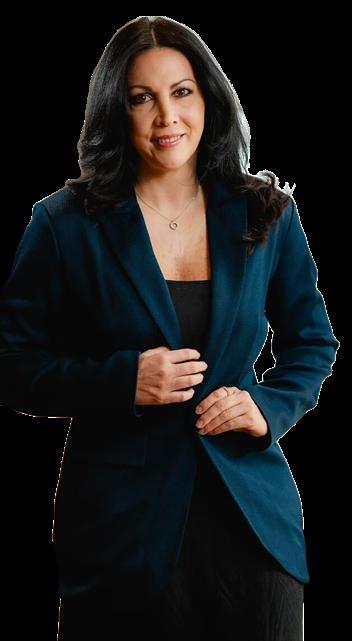
It’s a disruptive company - it thinks differently
Diana Otalora, General Manager LATAM
Latin America faces many tax changes all at once, especially since markets are going through different stages of regulation, each with its own details and ecosystems. Brazil, as an example, is undergoing constant tax reforms, such as the suggested raise from 12 per cent to 18 per cent in tax on Gross Gaming Revenue (GGR). How does Stake evaluate these tax changes across Latin America?
“We constantly monitor regulatory changes,” explains Gomez. “We like to speak with regulators to explain the good practices we’ve implemented in other markets. When we anticipate a negative change in another country, we engage with regulators to present our perspective. We always aim to implement the regulation fully, involving all departments in the company.”
“Regardless of the changes, our goal is to ensure they don’t impact the player experience. What we aim for is that, above all, players always have the best experience. We organize ourselves to guarantee that,” adds Muñoz proudly.
By the end of the conversation, the big picture is clear: the key to achieving professional success as a company lies in seeking people who are not afraid of change – not just willing to embrace it, but eager to take bold steps into the unknown. Not because they have all the answers, but because they can adapt to different scenarios, moving forward steadily and calmly, one step at a time, rather than standing still and waiting for the future to come to them.

Anti-fraud solutions at every step of your customer journey
Despite the all-encompassing gloom of taxes, Europe remains a listings destination for gambling enterprises, proved by CIRSA and Hacksaw, writes SBC Editor At Large Ted Menmuir

The 2020s began with the prevailing sentiment that iGaming was entering a new era of regulatory acceptance and economic alignment. The thinking was fuelled by the repeal of PASPA, which would be followed by the opening of new jurisdictions globally, and the acceptance of nuances of open and fairly designed frameworks to regulate iGaming.
Yet, the ensuing years have seen that rose-tinted picture quickly dissipate with the industry becoming more conflicted in its regulatory affairs, with markets in Europe, North and South America taking on overbearing and fragmented legislation to govern gambling.
A bitter pill to swallow for those who once proclaimed that the 2020s would be the ‘decade of the dealmaker’, underpinned by free-market optimism. Instead, the era has shifted toward that of the compliance manager… just ask any commercial or marketing officer.
Yet at this mid-point of this most disruptive of decades, there’s little room for reflection. The headwinds of tax increases now loom over every operator – from the Netherlands, France, Sweden and the UK and all the way over to North and South America.
These tax increases have been implemented abruptly, forcing executive leadership teams to revisit growth strategies and rework investor prospectuses. This is a difficult balancing act, particularly given shareholder expectations of consistent yearon-year growth.
Despite the gloom, the recent European IPOs of CIRSA in Spain and Hacksaw Gaming in Stockholm offer a counterpoint to the pessimists. They should be viewed as good news messengers in a year dominated by global headwinds and fragile investor confidence due to persistent trade tariffs, Eurozone FX volatility, and macroeconomic uncertainties across capital markets.
Both enterprises pursued ‘partial listings’, a strategic choice in 2025’s unpredictable capital environment. Rather than going all-in, they tested investor sentiment with measured offerings and the results paid off.
CIRSA returned to public markets with a valuation of approximately €3.5bn, marking a successful exit for Blackstone while reaffirming market confidence in
the prospects of a large-scale, omnichannel operator enhancing its presence in nascent South American markets.
Meanwhile, Hacksaw Gaming, listing on the Stockholm First North Growth Market, secured a valuation of around €450–500m. For a mobile-first, B2B content studio founded just seven years earlier, the IPO sent a strong message: investor appetite remains for lean, product-driven suppliers who can scale profitably.
Investor enthusiasm is no longer fuelled by scale or story alone. What matters now is disciplined growth, sustained profitability, and rigorous cost control.
Hope shines as, in unique ways both IPOs prove that European gambling firms whether heritage institutions or challengers can still capture capital market attention, provided they offer clarity, focus, and a coherent growth trajectory. There’s still capital out there, but only for those who know how to attract it.

Scan here for more from SBC News
Words by TED MENMUIR
Investors increasingly demand higher margins but replacing traders with AI bots is not the answer, argue MATTHEW TRENHAILE of Anubis Trading and Superbet Chief Product Officer IVAN GOJIC
t the mid-point of a transformative decade for all gambling disciplines, it is wise for audiences to review the evolution of values and dynamics placed on operators.
Many observers anticipated that the 2020s would be defined by expansion into new markets in North and South America, amid the backdrop of stagnation and competitive fatigue across heritage markets in Europe.
For all the change, the demands on leadership remain plain and simple as investors demand operators expand their market access, drive scale and take market share – best put bluntly as “plan, strategize and execute”.
Yet the real shift has occurred beneath the radar, and within the balance sheets. Sportsbooks, once relentlessly growthdriven and expansionist in nature, are now contending with a new commercial reality: margin pressure.
Margin pressure has become a naked reality, as investor sentiment has pivoted on how to
value gambling business, and efficiency has become the dominant factor. The focus is no longer on gross gaming revenue alone, but on underlying profitability, sustainable cost control, and operational efficiency.
Across all tier one sportsbooks, the recalibration has triggered a strategic rethink, which for leadership teams starts at the core discipline of risk management.
As cost efficiency dominates all strategies, the industry’s traditional playbook of generous promotions, mass bonusing, and customer valuations is being re-examined as cost of growth is now viewed as a threat to margin.
Strategic changes to the composition of modern sportsbooks have been closely followed by Matthew Trenhaile, Managing Director of Anubis Trading. A veteran of both Pinnacle and Sportradar, Trenhaile, now works directly with bookmakers to optimise their trading models for high-exposure events where traditional margin control often breaks down.
Trenhaile remains a firm believer in building sportsbook infrastructure from the ground up starting with the trading room. In his view, the shifting commercial priorities of the sector must not come at the expense of the foundational principles of risk. “Trading should be the hub of the wheel. If it’s not, you’re missing a trick,” he observes.
Yet as operators respond to investor calls for cost discipline, many are reducing headcount on the trading floor and leaning heavily on automation. AI-driven pricing models, algorithmic trading systems, and real-time monitoring tools are being deployed to maintain market coverage at scale and speed.
Trenhaile cautions that automation should not run in contradiction to cost control - it should support it. Critically, these systems must not replace the tactical learnings, nuances and live decision-making that experienced trading teams have. “The trader is still the only one who sees customer behaviour in real time. They know what bets are coming in and what patterns are emerging. They see the lifeblood of the sportsbook.”
While technology enables efficiency, the competitive edge lies in how it’s combined with human expertise. Removing traders entirely, or relegating them to passive roles, risks stripping sportsbooks of the very insights that make risk management commercially intelligent.
A coalface perspective is offered by Ivan Gojic, Chief Product Officer (CPO) at Superbet, the leading sportsbook across Balkan markets and one of the few operators in Europe to achieve genuine scale beyond its home market. Backed by over £1bn in investment from private equity firm Blackstone, Superbet represents a modern case study in how operational discipline, product innovation and commercial performance can be aligned.
For Gojic, the debate is not whether sportsbooks can control sharp action, but whether they should even try to. In
his view, true value lies in operational sharpness, not aggressive limitation. “You’re going to get picked off - maybe by 5 per cent of your customers - but if your systems are built to learn from that and adjust in real time, you’ll come out ahead.”
He adds: “Too often risk is framed as a threat instead of an opportunity. You’ll always have strong bettors. Your job is to know who they are, what they want, and where you can still make margin. That’s what investors care about: a sportsbook that knows the value of every bet it takes.”
Gojic argues that what defines a “sharp sportsbook” in today’s market is not its ability to eliminate risk, but its ability to manage exposure smartly, especially under cost pressure. This sharpnessrooted in scalable infrastructure, data intelligence, and smart feedback loops - is increasingly what appeals to investors. In other words, it’s not about “catching every edge case; it’s about showing that the business is structurally sound and commercially aware of where value lies.”
As operators continue to automate and standardise, the risk is that they spend disproportionate energy defending against a small percentage of sophisticated customers, rather than optimising for the 90+ per cent of users who represent recurring, recreational value. Gojic warns that “hyper-defensive trading, where risk is equated with exposure alone may create more churn than it prevents, preventing long-term growth”.
Put simply, managing sharp action is not the same as controlling it. The former requires awareness and adaptation; the latter, if pursued too rigidly, can undermine both profitability and user experience.
Investor pressure on bookmakers to maintain a recreational model for each specific market has brought a wave of structural pressures on the management of bookmakers. As such, most operators follow a “low risk, high control” approach - pricing markets defensively, limiting bet size exposure, and automating restriction thresholds to reduce volatility.
“
What investors care about is a sportsbook that knows the value of every bet it takes
The above model has proven commercially efficient, particularly in regulated markets where compliance demands, bonus caps and tax burdens tighten margins. But in the process, a new and arguably overlooked vulnerability has emerged: uniformity itself.
“If every bookmaker is avoiding sharp action and aggressively defending against any perceived risk, then who is left to service the serious bettor?” Gojic notes.
As sportsbooks converge around similar pricing, limits, and UX frameworks, the high-value segments once seen as vital to market liquidity and brand differentiation are now under-served.
“We’re still more focused on the bad customers than the good. That’s the wrong way around,” he remarks. His view underscores a growing sentiment that by treating risk as a threat to be excluded rather than a discipline that needs to be managed, as many operators are sacrificing long-term value for short-term control.
2025 has already shown that volatility is not going away, simply look at the impact of the NFL Playoffs on Flutter Entertainment’s year-end results, in which the NYSE/FTSE gambling group had to explain a swing of $100m on the profitability of the FanDuel business to disgruntled investors.
Outcomes driven by long-shot parlays, multi-leg accumulators, and mass surges via influencers or Telegram channels have become common - especially in hypersocial, high-frequency markets like Brazil.
These events routinely disrupt risk models and trigger public questioning of the bookmaker’s generosity and exposure.
But for trading teams, investor concerns over promotions of generous odds, incentives and accumulators is misplaced. The issue is not ‘generosity’ but aptitude. Operators that understand volatility, segment their customer base correctly, and manage pricing intelligently are better positioned to withstand short-term turbulence without retreating into uniformity.
Risk management will remain the apex discipline of sports betting regardless of regulatory shifts, evolving customer behaviour, or investor-led pressures for cost controls. It remains at its core function that ultimately defines whether a sportsbook thrives or stalls.
Yet the dynamics of risk are changing. Automation, data, and intelligence systems now govern vast areas of pricing, customer management, and market exposure. What was once an instinctive craft is becoming a science of scale and speed.
Still, the question remains: as we close out the decade, will risk management continue to be treated as the do-or-die domain it once was? Or will its edge be dulled by the creeping uniformity and overreliance on automated systems? This may well determine the winners and losers of the next generation of sportsbooks.
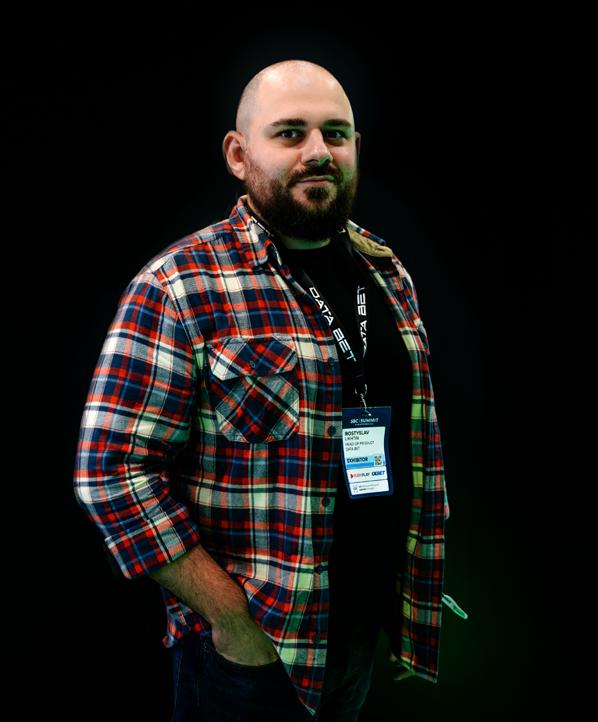
“ Scraping creates an innovation death spiral. The impact on niche disciplines and local championships is particularly devastating
ROSTYSLAV LIKHTIN, Head of Product at DATA.BET, on the controversial practice of scraping, which is driving modern betting
The sports betting industry underwent a seismic shift when live wagering arrived. Markets that once updated hourly now demand precision measured in seconds. This has complicated the creation of betting products and led to the emergence of solutions such as scraping, the automatic parsing of data from competitor sites, instead of working with official data sources.
The transformation began in the 1990s when traders sat with Excel spreadsheets, relying on basic ranking models and their experience to set lines. The first era was purely physical – offline betting shops built on face-to-face interactions, phone calls, and paper coupons.
The 2000s brought the internet revolution. The first bookmaker websites emerged and started accepting online bets. And this changed everything. The market began demanding instant decisions and precise odds: trading has become a genuine speed race.
Then came smartphones and mobile internet, giving bettors access anywhere, anytime. From that moment, everything became global, and the industry growth rate reached a new level.
Today’s betting platforms employ dedicated in-house traders, automated models, ranking algorithms, and risk managers operating in real-time 24/7 to be a step ahead in the market race. The industry started speaking a new language – APIs, SDK, live/pre-event feed, etc.
Today’s bettors expect instant everything. Odds must reflect every goal within seconds. Markets must cover thousands of daily events. Pricing must respond to the slightest market movement. However, this created a new challenge: developing and improving betting products became increasingly complex. With ready-made solutions using official data costing hundreds of thousands annually, smaller market players began searching for alternatives; high-quality data at a fraction of the price.
The transition from manual updates to real-time systems wasn’t just technological, it fundamentally changed how we think about markets. And then scraping entered the scene. Scraping is the solution that allows for receiving data from various bookmakers in real time.
This democratisation has flooded the market with new operators, particularly benefitting startups that couldn’t afford traditional entry costs. It’s pushed providers to constantly develop and update their models, creating more complex and advanced solutions with a unique user experience, and it’s hardly possible to scrap.
Scraping is the automated extraction of odds, markets, results, and other data directly from bookmaker websites. Still, this approach requires technical expertise and time, but it’s significantly cheaper than getting licensed content from official data providers.
However, scraping also had positive outcomes. Paradoxically, it gave the market a significant push forward. By dramatically lowering costs, it opened doors for new operators who couldn’t afford official data. This influx of competition compelled established players to refine their offerings and accelerate their innovation cycles.
Yet this data availability brought both opportunities and challenges,
like enhancing trading decisions, supporting line development, and strengthening anti-fraud measures by helping operators understand betting patterns.
This technological arms race creates constant pressure. When everyone monitors everyone else, the speed of line updates, odds accuracy, and product quality must continuously evolve. Operators find themselves in an endless cycle of watching and being watched, pushing innovation at a breakneck pace.
Walk through any betting platform today, and you’ll find remarkable similarity. Same matches. Same markets. Same pricing patterns.
This isn’t a coincidence, it’s the natural outcome when operators use identical data sources.
But the deeper damage lies in economic destruction. When everyone parses each other’s odds, a race to the bottom becomes inevitable. Premium pricing built on expertise collapses within minutes as competitors undercut with copied data. The product becomes devalued: why pay more for carefully designed odds when identical lines are available cheaper (or for free) elsewhere?
In turn, scraping creates an innovation death spiral. Companies investing millions in original content creation and sophisticated analytics watch their work replicated within seconds of publication.
The impact on niche disciplines and local championships is particularly devastating. When companies rely mainly on parsing from open sources, such events are often overlooked or reflected superficially, without high-quality analytics. The line becomes incomplete or irrelevant, and the betting offer turns monotonous.
Let’s take, for example, the Pesäpallo (Finnish equivalent of
baseball) or regional leagues, even for popular sports. These require genuine local knowledge, cultural understanding, and dedicated resources – investments that can reach millions annually.
However, when that data can be harvested by competitors who contributed nothing to its creation, the rational response is to abandon these efforts.
The result is superficial coverage everywhere, with a deep understanding nowhere.
Scraping is neither hero or villain, It’s simply market evolution. The practice reflects an industry that transformed from handwritten odds sheets to algorithmic pricing in just three decades. But this technological shift created a fundamental question: where does competitive advantage lie in a world of universal data access?
The answer isn’t in choosing between scraped or official data – both have become part of the ecosystem. Instead, sustainable success requires building unique value that transcends data sources: proprietary algorithms, exclusive content partnerships, innovative betting products, and superior customer experiences. When everyone can access the same odds within seconds, differentiation comes from what you create beyond the numbers.
In an industry where information has been commoditised, competitive advantage belongs to those who can build something unique on top of that common foundation.
Scraping democratised the industry and intensified competition, but it also revealed a timeless truth: in betting, as in any market, sustainable success comes not from having the same information as everyone else, but from using it better than anyone else.


















































































A serious esports strategy isn’t a niceto-have anymore, it’s how you stay relevant “
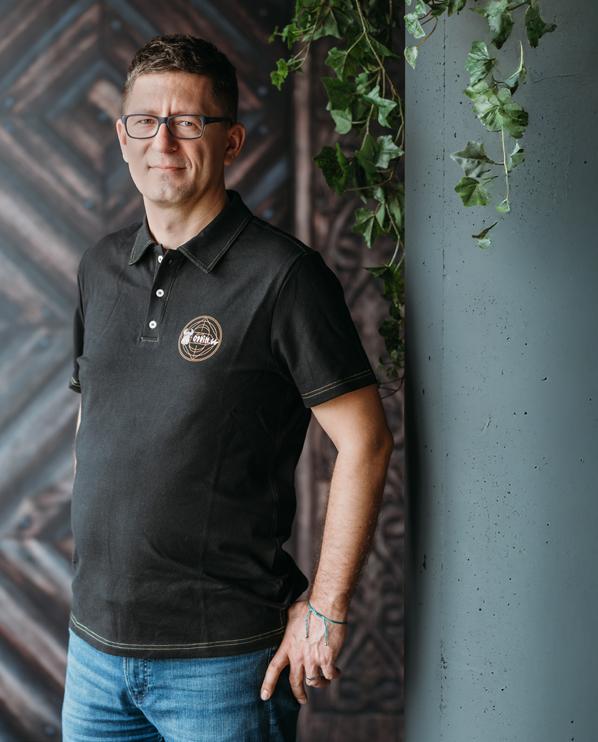
In Europe, esports has already made its way into national lotteries and major state-backed operators. Partners like Veikkaus in Finland, Danske Spil in Denmark, Sazka in the Czech Republic, and OPAP in Greece have all added esports to their offering. That speaks volumes. These are traditionally cautious entities, and when they move, it means something.
In the US, progress is also steady. State by state, esports is being added to official betting catalogs, and we’re actively working with regulators to educate them on how esports betting works and how to implement it responsibly.
The bottom line? Esports is no longer something operators can afford to “wait and see” on.
Esports is often treated as one product but that’s not quite accurate, is it?
Not at all. As I touched on earlier, what we call “esports” actually covers two complementary verticals. First, you’ve got traditional esports titles: CounterStrike 2, League of Legends, Dota 2. Then you’ve got “electronic simulators” - what we call eSimulators or eSims - fast-cycle, studio-based content like eFootball and eBasketball, played head-to-head by real human players. They’re not RNG-based or pre-recorded like virtuals.

In our case, these are live, 24/7 matches streamed by ESIC(Esports Integrity Commission) certified third-party studios. That makes them familiar and accessible for traditional sports bettors, but with the speed and availability esports fans love.
Tipsport, one of our long-time partners, told us eSims is now a major retention tool, with average stakes much closer to football than to “classic” esports like CounterStrike 2 or League of Legends. And across our network, eSims now represents 8–15 per cent of real sports handle. So, for example, eFootball alone averages around 10 per cent of real football handle.
So if you’re only offering one side of the equation, you’re missing what makes this vertical truly scalable.
What’s the risk in treating esports like an add-on?
You risk falling out of sync with your future bettors. Gen Z bettors don’t default to legacy brands. They choose platforms that offer speed, personalization, and entertainmentespecially mobile-first ones.
If your esports experience feels like an afterthought, they’ll look elsewhere. And once they’re gone, it’s tough to win them back.
That’s why a serious esports strategy isn’t a “nice-to-have” anymore, it’s how you stay relevant.
Let’s talk product. How does Oddin.gg help partners deliver on those expectations?
We’re the only provider offering a true end-to-end esports betting ecosystem. Odds feeds, BetBuilder, 24/7 content, iFrame, risk management – it’s all modular, but designed to function as one integrated system.
Take our risk management layer: it’s not manual or reactive, it’s AIled, real-time, and integrated into the core of our system. It flags suspicious patterns, manages exposure, and keeps the operator protected while still optimizing for performance.
Our partners see the difference: those using both our odds feed and risk management consistently report double-digit percentage improvements to their margin. That’s a clear bottom-line impact.
Your BetBuilder is getting a lot of attention lately. What makes it so impactful?
BetBuilder is a good example of where personalization meets performance. It’s the first in the industry to support both esports (like Counter-Strike 2) and eSims (like eFootball), and it’s built for scale.
For Counter-Strike 2, bettors can combine up to 97 selections across 10+ markets. For eFootball, it’s up to 26 selections across 12 markets. That means hundreds
of thousands of possible combinations in a single match –perfect for a generation raised on customization.
We’re seeing significant growth in terms of volume but also in margin performance, with partners reporting double-digit improvements since its inception.
Most importantly, it wasn’t built in isolation. It’s the result of direct partner feedback, shaped by what real sportsbooks said they needednot what we think sounds good in a product pitch.
Looking ahead, what will separate the leading esports betting operators from the rest in the next 12–24 months?
Three things: quality, scale, and relevance. Operators who treat esports as a serious, standalone vertical – not just a side project –will outperform.
That means understanding the next generation of bettors and meeting them with the right product stack. It also means working with providers like Oddin. gg, which can deliver at scale across both esports and eSims without compromising on margin or integrity.
The next wave of growth won’t come to those who wait. Esports isn’t waiting around for anyone. And neither are the bettors.



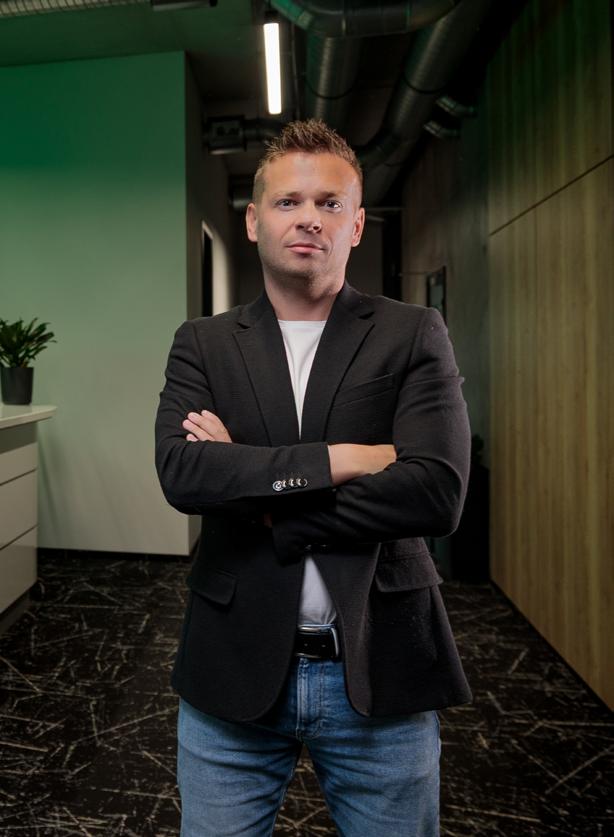
In a world where sports data is ruled by scale and speed, Polishborn STATSCORE is rewriting the playbook. Rather than racing to outsize the competition, the company is focused on a different kind of growth – one rooted in culture, values, and lasting purpose, CEO DARIUSZ ŁĘCZYŃSKI tells SBC Leaders
SSTATSCORE’s rise over the past two-and-a-half years has been nothing short of remarkable.
Under Dariusz Łęczyński’s leadership, the sports data provider has doubled both its annual revenue and workforce, relocated to a new office three times larger than its previous headquarters, and completed a full rebranding to reflect its evolving vision and market position.
During this period, STATSCORE launched two innovative products: PointsInPlay, a gamified engagement platform, and Tipster, a robust solution offering actionable pre-match and live betting insights. The number of live play-by-play games covered by scouts has doubled, while the depth of live sports data collected has grown significantly.
The company also forged strategic partnerships with some of the industry’s most prominent brands, enhanced operational efficiency, and successfully transitioned from negative to positive equity – establishing itself as one of the fastest-growing players in the sports data sector.
Moreover, STATSCORE has made strides in global expansion, entering new markets across Europe, Asia, and Latin America, one of the fastestgrowing regions for sports data and betting services.
The company praises Łęczyński’s strategic leadership as a driving force to help position STATSCORE as one of the most exciting and value-driven tech players in the sports data industry.
Based in Katowice, Poland, STATSCORE is focused on sports data collection, distribution and data visualization. It delivers real-time, reliable stats across more than 30 sports. The company offers a wide array of products, including fast and precise low-latency data feeds, engaging widgets and trackers, mini-sites and competition hubs, and gamification solutions.
These products have been adopted worldwide by sportsbooks, media outlets, and sports organizations. In the first half of 2025 alone, STATSCORE’s widgets generated 3.5 billion views, highlighting their global reach and growing impact in the industry. But its real advantage isn’t scale - it’s the mindset.
“We deliver results others can’t. Not because of a bigger budget, but because of how we work together and how we respond to our partners true needs,” STATSCORE’s CEO says.
“We aim high but on our own terms. Our goal is to be the most trusted, most innovative, and most collaborative provider for our partners worldwide,” adds Łęczyński.
From his high school days, he was drawn to the world of iGaming, a passion that eventually led him to join STATSCORE.
Having climbed the ranks over many years, Łęczyński gained a deep understanding of the company from the ground up before ultimately becoming its captain. His hands-on experience and dedication have shaped his leadership approach, guiding STATSCORE through a period of growth and transformation.
In a time when AI and automation dominate the industry, we take a measured and thoughtful path. We invest in intelligent technologies where they truly add value
“


In the first half of 2025 alone, STATSCORE’s widgets generated 3.5 billion views “

“STATSCORE’s challenger position is fueled by a sharp focus on delivering precise data, staying agile, and forging strong, lasting partnerships. We’re passionate about driving customer-centric innovation that keeps pace with the fast-evolving sports industry,” states Łęczyński.
“We live sports. It’s not just our product – it’s who we are,” says STATSCORE’s CEO. “When you’ve trained, competed, or supported your team through every win and loss, you understand sport on an emotional level. That connection shapes how we build our tools, how we tell stories with data, and how we serve our clients.”
That authenticity resonates in everything the company creates – from live scouting to powerful trackers and predictive insights. Passion drives precision, innovation, and impact.
“We hire based on mindset. Then we create space for people to grow with trust, autonomy, and clarity,” explains Łęczyński.
“We focus so much on creating an environment where people feel
trusted, have room to experiment, and know exactly what success looks like”, he adds.
As STATSCORE expands into new markets, it continues to leverage advanced technologies like AIenhanced data insights to deepen the accuracy and richness of its sports data.
By increasing the number of data points collected per event, the company drives more detail and structure to its information delivery.
Looking ahead, STATSCORE aims to double the number of sports disciplines it supports within the next two years, significantly broadening its coverage across leagues and competitions worldwide.
“While we continue expanding into new areas like gamification, our core focus remains the same: delivering quality in-depth data feeds and advanced data visualization products that redefine how fans experience sport”, says Łęczyński. “Very soon, we’ll be introducing new real-time solutions aimed at taking live
match engagement to the next level.”
These tools are set to provide detailed information, and craft dynamic, immersive experiences for sportsbooks, media, sports organizations and fans alike.
As Łęczyński highlights, one of STATSCORE’s greatest strengths lies in its approach to partnerships. “In a time when AI and automation dominate the industry, we take a measured and thoughtful path. We invest in intelligent technologies where they truly add value, but we never lose sight of what matters mostauthentic, human connection. Our partners know they can always rely on real, personal support, and we take that responsibility very seriously.”
This mindset reflects STATSCORE’s broader commitment – not just to cutting-edge innovation, but to building long-term, trustbased relationships that stand the test of time.
“Being a challenger means staying focused on people, partnerships, and purpose. That’s how we grow. That’s how we lead,” concludes Łęczyński.
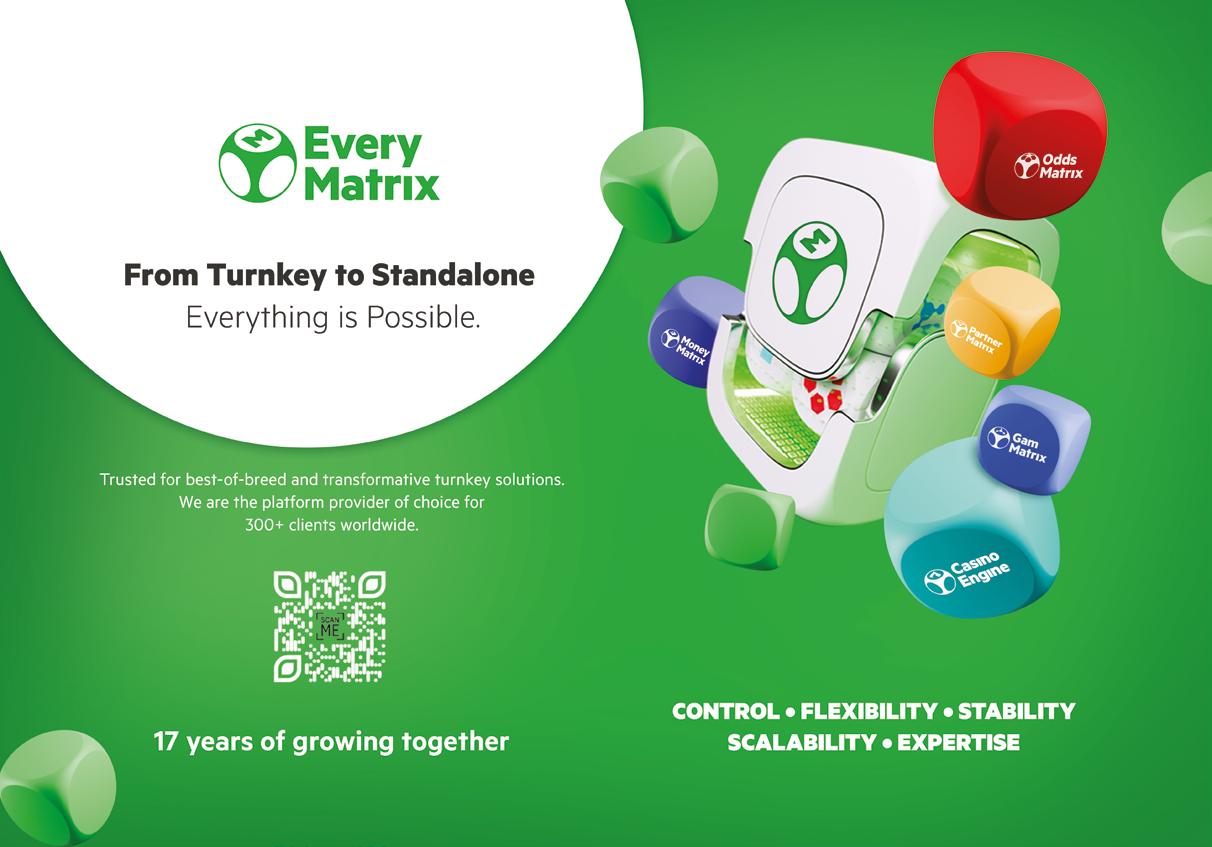

64 Interview: Totogaming CEO and Deputy CEO 68 Interview: Gamomat’s Iris Wallner
72 Interview: Elantil CEO Jonathan Gauci
76 Interview: Edgelabs CEO Marina Rodov
80 Thought leadership: Bragg CEO Matevž Mazij and AI EVP Luka Pataky 84 Thought leadership: Soft2Bet CPO Yoel Zuckerberg
88 Interview: Michael Bauer of Greentube
92 Interview: Yuriy Muratov of 3Oaks Gaming
96 Interview: Vegangster CPO Michael Oziransky
iGaming Expert Editor Joe Streeter spies lessons to be learnt as Thailand’s casino bill stumbles

It was widely anticipated that Thailand was on a oneway trajectory to casino legislation. However, as we enter the second half of the year, the country is looking at a new premiership and the hopes of the gaming industry have rapidly dwindled.
There have been numerous twists and turns on this journey. The bill was formalised in September 2024 and excitement was palpable about its possibilities. But its halt could have a significant impact on the economy and on the growth of the casino industry in Asia.
As an increasing number of nations begin to explore new gambling regimes and opportunities for emerging markets pop up at an increasing rate, the downfall of Thailand’s hopes reveals the fragile nature of such legislative attempts.
Despite the best efforts of the government to accelerate the bill, fine print of the legislation led to it encountering a few hurdles including public discontent.
One of these was the touted limitations on Thai residents being able to enter the casinos.
The Thai government did not entertain the idea of allowing domestic residents to gamble, which dwindled the momentum of the bill and ultimately stunted its progress.
From the outset, Prime Minister Srettha Thavisin made it clear that the bill would be part of bringing the ‘fun economy’ to the country.
As the potential legislation was sent back to the public for feedback, it was clear that it would be focused on the tourist economy rather than the domestic economy, a factor that would cause its downfall.
Just a few months earlier, amid much speculation, the Government backed a House Committee report and the path seemed relatively clear for the regulation of land-based casinos in Thailand.
However, the downfall of Thavisin’s leadership caused the bill to be thrown into jeopardy.
In August 2024, optimism returned as Paetongtarn Shinawatra was sworn in as the country’s youngest Prime Minister.
This was thought to be a boost for the trajectory of the casino legislation, as it was something that the cabinet of Shinawatra had consistently backed. Compounding this sentiment, the potential
positive impact of integrated resorts in Thailand had been lauded by the father of the new Prime Minister, and the country’s former leader, Thaksin Shinawatra.
The former PM even fuelled excitement around the potential for iGaming in the country as he warned of the importance of strangling the black market.
The downfall of the Shinawatra dynasty signalled the end, at least temporarily, for the momentum of gambling resorts in Thailand.
As Shinawatra’s premiership was toppled, and political volatility was elevated, a motion was put forward to halt the progress of the bill.
Sometimes economic upside isn’t the sole reason casino legislation will gain momentum. The will of the people to want to engage with gambling is also vital. Furthermore, for operators looking to embrace emerging markets, Thailand’s troubles are a reminder that political volatility must always be figured into your plans.

Scan here for more from SlotBeats
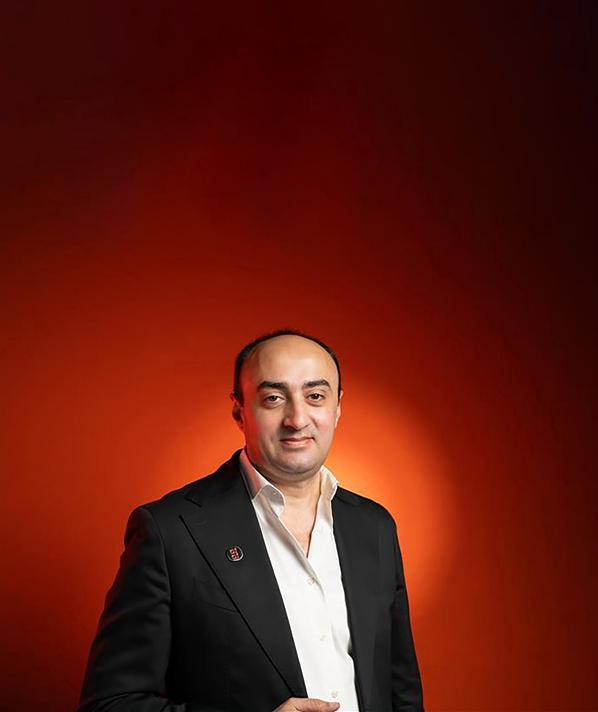
Romania has endured a regulatory crisis like no other, with politicians calling for the abolition of the gambling regulator.
Totogaming CEO HARUTYUN VARDANYAN and his Deputy ARTAK ASHKHATOYAN explain how to survive and thrive despite a tidal wave of regulatory uncertainty

In February 2025, an independent government audit of Romania’s National Office for Gambling (ONJN) uncovered a black hole in the regulator’s fiscal duties that had swallowed nearly €900m in licence and tax revenue for the period between 2019 to 2023.
The findings cast a huge shadow over the industry. Romania introduced a multi-layered overhaul of its tax regulations, including new licensing fees and thresholds on revenue taxes. Beyond increased taxes, what impact has this had on the country’s operators? Well, it is certainly stressful, says Totogaming Deputy CEO Artak Ashkhatoyan.
The fallout of the scandal saw the ONJN recruit a new President, VladCristian Soare, who has rolled up his sleeves and taken a hardline approach in a bid to improve the image and credibility of the regulator.
Ashkhatoyan says the market has witnessed a much more “aggressive” ONJN since the moment the news about the audit broke and this is now putting greater pressure on operators.
“On a monthly basis, we face at least two new inspections. It can be related to taxes, it can be connected with the self-exclusion registry, it can be related to financial reporting, and everything in between. Every aspect of our gambling business is now being looked at.”
But the uncertainty remains. CEO Harutyun Vardanyan draws a parallel between Romania and Armenia - TotoGaming’s home - with the most evident difference between them being the level of confidence they have in the regime in order to implement long term plans.
“A legal change can occur [in Romania] on any given day and take
effect immediately,” explains the CEO. “Businesses are not given time to adapt to the new legal environment or adjust their business plans. Changes happen overnight. In contrast, in Armenia, businesses are given at least six months after a law is passed before it comes into force, making it easier to prepare. It should be noted that in Armenia at the same time, draft laws are often created overnight, leaving little time for operators to discuss or respond.”
Communication between regulators and operators does take place, but through third party associations. Vardanyan believes that this should instead be done directly, at least with the top five operators, of which ToToGaming Romania aims to become in the next two years.
The Armenian operator launched in Romania in 2024 and has quickly secured significant market gains thanks to a unique set of customer retention tools that are tailored for the local market. These include the “Big Promo” promotion, giving customers daily login medals that can later be used to win between RON1,000-20,000 ($230-$4,590).
The team also believes its unusually speedy customer service call centers help it stand out in Romania.
“We have the fastest customer care call center on the market, according to our in-house research,” Vardanyan explains. “There are operators in the Romanian market who do not offer 24/7 service, while we not only provide around-the-clock support but also respond twice as fast - and not just among gaming operators, but across the entire Romanian customer service market.”
On a monthly basis, we face at least two new inspectionsevery aspect of our business is being looked at “

Artak Ashkhatoyan, Deputy CEO
It is clear that TotoGaming is heading in the right direction. But will it be stifled by volatile regulations and unstable market governance?
The ONJN is facing significant pressure from political groups who want to abolish the regulator and transfer oversight of the market to another government body.
Despite the upheaval, some believe this might be a positive development. However, Ashkhatoyan is confident the regulator has turned over a new leaf.
“They are cooperative,” he says. “I feel that they are trying to find a solution to every problem through discussions with all licence holders, regardless if it’s a landbased casino, an online operator, or something else. They are very transparent about the actions they take or they are about to. And they are expecting the very same from operators, which is normal.”
“If we want to develop a market with a high level of social responsibility, it means that the regulator and the operator should be open to each other in a cooperative manner,” concludes Ashkhatoyan.
Ashkhatoyan is hopeful the controversy will have little or no effect on players’ trust in the market.
“Players are not kids”, as he puts it, and are fully capable of recognising that all stakeholders are doing everything in their power to increase the level of responsibility the market has towards its customers.
“On one hand, they see that the government is doing everything to protect the players. On the other hand, they see that operators are also very open to converse with them,” continues Ashkhatoyan. “We have an established government in favour of a market with clearly defined rules and regulations. We also have an increasing population of
responsible players. As long as you have these two in place, the market will remain attractive.”
There is an abundance of gambling reforms tabled for review in Romania. One of the most important is updating the national self-exclusion system. However, this is just an evolutionary stage as the market keeps expanding. Local operators like TotoGaming are already quite experienced in promoting safer gambling, with deposit limits, reality checks, permanent and temporary selfexclusion, and time-out options.
At the time of writing, the majority of reforms were on hold as Romania welcomed a new cabinet under newly-elected President Nicușor Dan.
With two new Presidents at the helm - of the ONJN and of Romania itself - it seems that a new dawn is breaking. Whatever is in store, TotoGaming remains certain that it will play a key role in building a new chapter for the Romanian gambling market.




GAMOMAT lifts the curtain on the creative process behind Dead Legion’s evocative soundtrack. Lead Game Composer IRIS WALLNER tells SBC Leaders how she brought the game’s dark and dramatic world to life through a score that blends cinematic intensity with emotional depth fter collaborating with GAMOMAT for 15 years, what drew you to Dead Legion and convinced you it deserved a live orchestra score?
It’s hard to believe it’s already been 15 years! Over time, I’ve seen the audio side of our games grow so much. Dead Legion, a dark horror game, was the ideal opportunity to challenge the musical boundaries. I’ve always aimed to push audio quality to the next level – just like the video game industry evolved from chiptunes to full orchestras. GAMOMAT creates a wide variety of games, but it’s our most epic titles that lend themselves to orchestral treatment. Dead Legion instantly stood out: atmospheric and visually stunning. It was the ideal match for our first live recorded score.
How did the idea for an orchestral recording take shape, and what musical emotions did you want the players to feel?
I saw the first graphical sketches pretty early on and instantly loved the design. Right away, an epic, dark, and sinister soundscape

formed in my mind. My goal was to combine the quality of film scores like The Lord of the Rings with intense and unsettling elements. The music should take the player on a journey that feels epic and heroic but also ominous and otherworldly. At the same time, I didn’t want it to become too horror-esque or frightening, which can be quite a balancing act.
Can you walk us through the journey from the first musical sketches to the final orchestral score, and how you collaborated with the game designers along the way?
The creative process started with early musical sketches based on the game’s visuals to find the right emotional tone. In the case of Dead Legion, the ideas developed quickly and naturally. From there, I followed my usual production workflow, which always combines composition with detailed orchestration. Throughout that process, I worked closely with our Game Design team, who are always a valuable “second pair of ears” for all things music and audio. Their feedback helped shape the cues to perfectly support the game’s atmosphere.

We strongly believe that live recordings can elevate the quality of our game soundtracks to a whole new level

The final – and all new – phase was to notate everything and prepare the score for the recording session. Every step - from first drafts to printed sheet music - was driven by the goal of creating a soundtrack that completely pulls players into the world of Dead Legion.
What was it like to prepare for and lead a live orchestral recording – and was there a moment that stood out during the session?
Preparing for the recording was both intense and exciting. Once the orchestra was confirmed, I tailored the score specifically for a 64-piece line-up - knowing exactly who I was writing for made the process much more focused. We recorded at a well-known studio with musicians who have extensive experience with major video game and film productions.
On the day of the session, I conducted the orchestra myself, while our production team supported from the booth. Our close communication and cooperation were invaluable in the process. While the conductor is closer and can guide the musicians directly, the recording team hears the music from a perspective more like how the finished piece will sound. With only a few hours and everyone sight-reading, it’s a high-pressure environment where precision and efficiency are everything. Of course, there are always unexpected challenges - sometimes the parts you expect to be the hardest to record turn out to be easiest, and vice versa. You have to be well prepared and always have a “plan B” ready.
Standing in front of the orchestra and hearing your cue brought to life for the first time by those fabulous musicians is always a standout moment. The emotion that 64 well-rehearsed, professional musicians can create together can’t be compared to anything else. Those feelings don’t exist in samples. It’s powerful, raw, and unforgettable.
How did you ensure the orchestral tracks mesh seamlessly with gameplay and elevate the overall Dead Legion experience?
The key to making the orchestral score truly enhance the Dead Legion experience was careful planning right from the very first layout phase, combined with ongoing close collaboration with the entire product design team. Being deeply involved with the game allowed me to fully understand its atmosphere and pacing - that understanding was essential to crafting music that not only fits but actively supports the gameplay.

Of course, after the recording session, the work continued with editing, mixing, mastering, and integrating sound design elements to create a cohesive soundscape. The real test comes when you hear everything in the context of how the game unfolds – that’s when subtle adjustments and fine-tuning are crucial to ensure the music elevates the player’s immersion without ever overpowering it. The result is a soundtrack that feels alive, dynamic, and perfectly in sync with the Dead Legion world.
What makes Dead Legion unique – visually, mechanically, and especially sonically?
Dead Legion stands out as a pretty eerie game with its army of the undead, but not to the extent that it’s too frightening. Players who are familiar with our games will also immediately recognise its relationship with Roman Legion. Overall, the main ingredient for the game’s sonic landscape is the large orchestral cues, of course. They set the mood with ominous low strings and brass, heroic
horns, and driving staccato lines. But we also combined that with ambient sound design, battle sounds and processed voices for the undead to achieve an otherworldly quality.
What can you share with us about the upcoming release of Dead Legion?
One of the things I appreciate most about GAMOMAT is that we focus on creating standout experiences, not just pushing out content. Every release is treated as something special, and that’s definitely the case with Dead Legion. It’s not just a game - it’s part of something bigger: the launch of our horrorthemed line-up.
It kicked off with Book of Madness 2, the highly anticipated sequel to one of our most successful titles, followed by Dead Legion this month. Both games bring something unique to the genre, and together they expand our line-up of horrorthemed slots. What makes this especially exciting is the atmosphere we’re building
around the launch. We hosted a dedicated Night of Horror for our partners, which was a fantastic way to showcase and celebrate these standout titles in the right setting. It’s this kind of thoughtful, quality-driven approach that truly sets us apart as a studio.
Do you see full-orchestra productions becoming a signature feature in future GAMOMAT titles, and are any new projects already on the horizon?
Definitely. We strongly believe that live recordings can elevate the quality of our game soundtracks to a whole new level. We already recorded the score for a second title during the session, and we are in the process of planning the next orchestral recording for later this year. We are also adding live instruments and vocals when appropriate to projects with other musical genres, like pop, rock, or world music. Keep your ears open - there’s much more to come from our studio.
Elantil Founder and CEO JONATHAN GAUCI tells SBC Leaders how a lifetime of iGaming experience shaped the philosophy behind Elantil’s unique platform
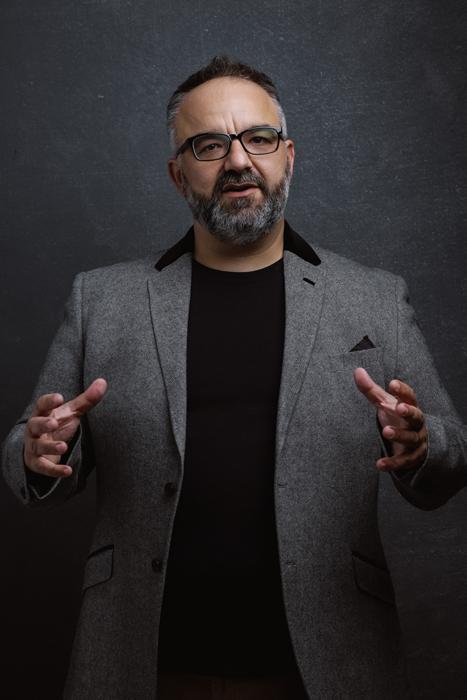
“ As a strategic backbone, it gives the creative rockstars inside the organisation the freedom to experiment with minimal investment
Technical deficiencies and inefficiencies are incredibly frustrating to deal with. When you have a vision for what a product or platform could look like, but the tools you are using don’t match those ambitions, it can lead to demotivation, missed opportunities or giving up altogether.
That’s the experience of Jonathan Gauci. Gauci, who has had a storied career in iGaming with the likes of GiG and Betsson, became frustrated by what he labels ‘legacy technology’ and strived for more.
With over 20 years of experience he founded Elantil. Formed in September 2024, Elantil is a platform provider that aims to deliver “comprehensive solutions that enhance companies’ casino operations with seamless growth, optimisation and scalability”.
“Elantil is a strategic backbone, not just a platform,” Gauci tells SBC Leaders. “It gives operators full control across player account management, data, front-end, and operations. We solve the fundamental issue most face: dependence on platforms that weren’t built for them. Elantil allows them to scale fast, move independently, and build real IP.”
With a real dedication to technological development, Elantil aims to provide a wideranging suite of solutions for operators. Throughout the year it has integrated B2B providers such as Alea, Altenar, Optimove and Yggdrasil to build out its marketplace solution, which gives operators access to a wide range of game providers, sportsbook platforms and other services, without any revenue share or any other hidden costs.
“Our strategy is simple: stay lean, sharp, and focused. We build what clients actually need, not what looks good in a pitch deck,” Gauci adds. “2025 is about creating a meaningful economy around us by bringing suppliers and operators together through our marketplace.
“We’re also enabling vertical integration by helping operators use our technology to build their own USPs. At the same time, we’re wrapping the product in key certifications like
GLI-19, GLI-33 and ISO 27001 to give peace of mind and accelerate market access.”
Having those certifications and weaving the principles of GLI-19 into its operations means that Elantil is set up for entry into a myriad of regulated markets. Particularly, the firm is looking at certain US states, the MGA market, the UK, Ontario and soon-tobe-regulated Alberta.
But Elantil is also seeing crypto casinos and sweepstakes operators taking an interest in its technology. Gauci thinks this is because Elantil seeks to intrinsically understand the demands of operators all over the world.
With this quest, Gauci wants to free the shackles from operators so they can have the solution they need to thrive.
He explains: “Elantil brings a B2B mindset and operational efficiency into the operator’s business. That makes multi-market, multibrand strategies technically seamless. But more importantly, as a strategic backbone, it gives the creative rockstars inside the organisation the freedom to experiment with minimal investment. It removes friction and allows innovation, without bogging down core operations.”
With such vast experiences in the industry, working with established providers and delivering solutions for operators such as Betsson and NetRefer, Elantil’s CEO knows the pain points operators have.
These problems are mostly tech-related, but Gauci also identified that the way they integrate and buy their tech also poses issues.
“Tier one operators usually face a binary decision: build or buy,” he says. “We offer a third path, more like a lease-to-own model. Think of it like hire-purchase. They get full access to a scalable, production-ready platform without losing independence, and over time, they can take full control. It’s a way to move fast, scale securely, and build long-term value, without starting from zero.”
We build what clients actually need, not what looks good in a pitch deck “

It’s a customisable model, but Elantil likes to think of it as a full framework so that operators can build their solutions internally from the ground up using its marketplace. It wants operators to feel empowered to make their own decisions and the marketplace is a primary driver of that empowerment.
“Most frustration comes from being stuck with generic solutions or having to wait an absurdly long time while newer options are stuck in a backlog. We remove that dependency – our clients get the tools and know-how to move fast and define their identity around our technology.”
As a business set up to tackle a perceived technological deficiency, Elantil aims to push boundaries and promote innovation across the iGaming industry.
It is adopting a multi-currency and multiwallet approach to enable operators to utlise a variety of currencies, both fiat and digital currencies. As digital and crypto currencies become more widely adopted, platforms must have the capabilities to cater for these markets while demand grows.
Elantil is doing this while remaining within the relevant legislative frameworks around the globe.
“Our tech supports operators as they adapt to new regulatory frameworks like MiCA in the EU, the GENIUS Act in the US, the UK’s Financial Services and Markets Act, and Hong Kong’s new Stablecoin Ordinance or simply when they adopt their own loyalty coins,” Gauci notes.
“As digital currencies gain ground, Elantil gives clients the flexibility to operate globally, now and in the future, without needing to rebuild their platform.”
Ultimately, Gauci and Elantil seek to remove barriers to entry for iGaming operators and foster innovation across the sector.
As it continues to roll out its solutions and bolster its marketplace solution, the company wants to make launching a new casino or sportsbook operation a faster and easier process.
“Our main goal is to commoditise the product to the point where launching a casino or sportsbook operation can be done directly from our website, in a matter of hours,” concludes Gauci. “We’re removing barriers, making setup seamless, and giving operators the tools to go live fast with full control. That kind of instant operability is what will make Elantil the default choice in this industry.”
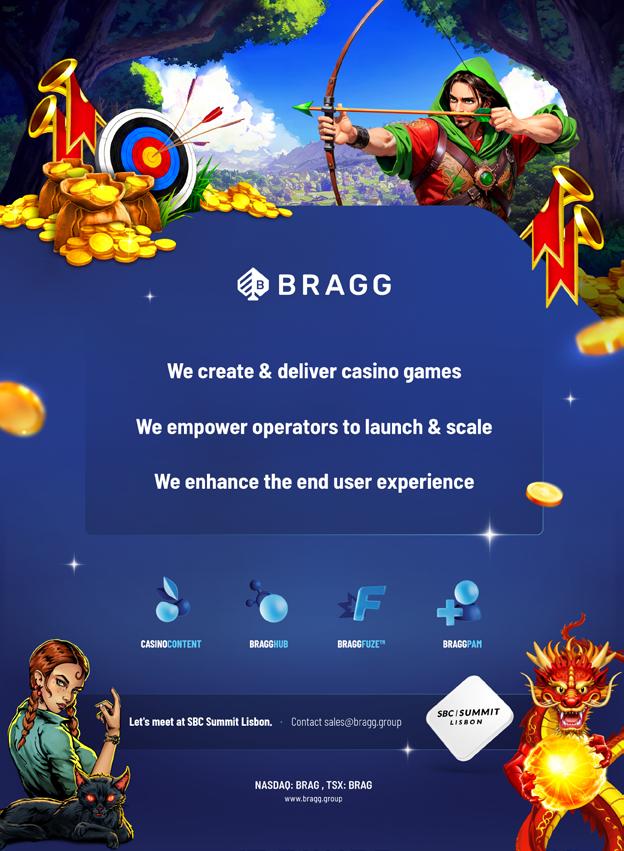

EdgeLabs CEO MARINA RODOV sits down with SBC Leaders to discuss the gaming provider’s impressive rise in the B2B online space over the last six months
elcome, Marina, it’s great to have you with us today. The first half of the year has just passed; what have been the highlights for EdgeLabs?
Well, there have been many highlights to talk about during what has been a truly remarkable year. First and foremost, we launched our games into the North American online market. We have a team of seasoned professionals with over 20 years of experience in the land-based space, and it was a huge transition to shift the overall direction we wanted to take our company in. The most important step was getting our games live with online operators and actually testing our content online in North America. Since we went live with 11 notable operators in just six months, our games are well positioned and deliver excellent results.
At our core, we’re committed to creating engaging and classic games. Our topperforming title, Diamond 10x, has been a major hit with the US players, validating our long-held belief that our classic style would resonate in the online market. It’s been incredibly rewarding, and we’re eagerly

awaiting the reactions of our players to our new and upcoming releases.
With the iGaming landscape consistently evolving, can you discuss your latest market expansions? What has EdgeLabs done to ensure compliance and customisation to fit diverse regulatory requirements?
We’ve all heard it a million times; the iGaming landscape is constantly evolving, and that’s never been truer than it is today. The market is oversaturated, with countless game studios jostling for position. Agility is something we at EdgeLabs understand very well, and it drives our ongoing commitment to adapt and grow in new regions.
On the market expansion front, we’re actively exploring additional jurisdictions across the globe that align with our growth strategy. Our recent partnerships with aggregator partners will soon launch us into new regions across Europe, Latin America, and Asia. We foster strategic partnerships to ensure success in these diverse and booming markets, and these partnerships provide invaluable insights into market dynamics.
“We’re not a one-size-fits-all solution, slowmoving and set in their ways like some of the massive gaming studios we all know and love
Compliance for us is paramount. We’ve built a dedicated in-house legal department to navigate the intricacies of ever-changing rules. Each game is meticulously curated to meet regional requirements, ranging from RTP adjustments to content localisation.
The iGaming industry, as you mentioned, is oversaturated, and many companies claim to be innovative. From your perspective, what differentiates EdgeLabs from just another gaming studio?
I’ll start my answer by telling you who we aren’t. We’re not a one-size-fits-all solution, slowmoving and set in their ways like some of the massive gaming studios we all know and love.
Our “newness” to the online market, what some might see as a weakness, is leveraged as our strength. We’re lean, we’re fast, and we deliver quality. We are integration-focused, offering dedicated integration support to ensure fast turnaround times. We have a dedicated art team for new and bespoke games, a specialised math team that analyses market needs and applies them to new player engagement titles, and 24hour customer support that actively monitors our games for operators.
Innovation might be one of the most overused terms in this industry, but for us, engineering principles are woven into the fabric of our game development cycle; from ideation to execution. Where many companies chase fads, we invest in long-term research and playercentric design, with feedback constantly looping back into development.
Tying it all back to our land-based beginnings, we have that edge based on a proven track record of delivering high-quality classic slots to
various operators. That foundation continues to serve us as we push the boundaries of what’s possible in the online space.
We’ll wrap it up with the necessary question: what’s next for EdgeLabs? What can we expect for the rest of the year and into 2026, especially when it comes to game formats and unique offerings?
We have a lot in store for the rest of this year and into 2026. One release I’m particularly excited about is Emily’s Treasure, our very first fish game designed for the North American market. Fish games have already proven to be a major hit in Asia and, increasingly, in the US, so we’re very optimistic about their reception.
We also have Mark of Z and Apollo’s Riches making their debut. Our studio has enhanced the successful Hold and Win feature by integrating more achievable goals, making the gameplay even more rewarding.
We’re also finalising new promotional tools that will be a great addition for our operator partners. Combined with that, we are offering our operators exclusive pre-releases and entirely bespoke games in addition to our new releases pipeline. It’s part of how we differentiate ourselves as a customisationfocused provider that curate’s content specifically for the platform’s audience.
As we expand into new markets, we will continue diversifying our portfolio with new genres. For instance, crash games are in the pipeline for the European and LatAm markets. Stay tuned for exciting new releases as we’re committed to providing the very apex of what is possible, and with it shaping the future of the online gaming sector.






MATEVŽ MAZIJ, CEO of Bragg Gaming Group, and LUKA PATAKY, EVP of AI and Innovation, unpack how artificial intelligence and machine learning are not just enhancing iGaming, they are rewriting its rulebook
The iGaming industry is undergoing a seismic transformation, one that isn’t optional. Artificial intelligence (AI) and machine learning (ML) are no longer futuristic experiments; they are core strategic assets separating tomorrow’s market leaders from yesterday’s incumbents.
At Bragg Gaming Group, we’re not reacting to this shift, our objective is to be leading it. We are embedding AI across our product stack, operations, and strategy with the strategic aim of driving a step-change in performance, player engagement, operational efficiency, and regulatory confidence. For investors, this isn’t about incremental improvements, it’s about unlocking exponential value.
HYPER PERSONALISATION: THE NEW GROWTH ENGINE
The era of static, one-size-fits-all player experiences is dead. AI can enable us to move from segmented marketing to true one-to-one engagement. Our advanced Fuze engagement platform is built to unlock the full potential of real-time, hyper-personalised content, bonusing,

and messaging tailored to each player’s unique preferences and behaviours, not based on guesswork, but on sophisticated predictive modelling.
Whether it’s suggesting the perfect game based on volatility preferences and play style, or dynamically adapting sound, visuals, and UX elements mid-session, we’re reshaping the player experience into something immersive and sticky over the long-term. The result? Increased session times, boosted retention, and a measurable uplift in lifetime value.
PLAYER JOURNEY CONTROL WITH TARGETED PROMOTIONS THAT PERFORM
AI isn’t just about knowing your players better, it’s about acting on that knowledge with surgical precision. AI can deploy intelligent bonusing strategies that eliminate waste and drive ROI. Instead of costly blanket campaigns, our systems will be able to identify exactly what promotion will drive conversion and retention when, how, and why. That means less spend, more revenue, and a smarter path to loyalty.
“
The era of static, one-size-fitsall player experiences is dead. AI can enable us to move from segmented marketing to true one-to-one engagement



“
Machine learning models can detect anomalies at a speed and scale humans simply can’t match, stopping threats like bonus abuse, money laundering and account hijacking
Today’s regulators demand more than compliance checklists, they expect proactive responsibility. AI is empowering Bragg to go beyond the standard by detecting micro-patterns in player behaviour that signal potential harm. Real-time monitoring and automated alerts allow for timely interventions, preserving players’ wellbeing and de-risking our partners’ reputations. This isn’t just ethical, it’s essential to long-term viability.
iGaming platforms are high-frequency, high-value environments — ripe targets for fraud. But AI flips the equation. We are building machine learning models that can detect anomalies at a speed and scale humans simply can’t match, stopping threats like bonus abuse, money laundering, and account hijacking before they cause damage. For operators and investors alike, this means less fraud loss, greater platform integrity, and stronger regulatory trust.
AI doesn’t just touch the player side it can also transform our internal engine. From predictive analytics and system optimisation to customer support automation and resource planning, AI enhances decision-making and execution

across the board. We’re seeing tangible efficiency gains, faster time-to-market, and a sharper competitive edge, all of which compound value creation.
Our AI-driven tools can even analyse player feedback and content performance to guide game development, informing not only what to build, but how to build faster and smarter. That translates into better-performing products and stronger partnerships with operators.
At Bragg, we’re not working to layer AI on top of old systems, we’re building it from the inside out with AI as a foundational layer. This is the culture shift. It’s about how we empower teams to move faster, smarter, and with data as their compass. We’re creating an AI-first business, and we believe that’s the future of iGaming.
For investors, the implications are clear: AI is not a cost centre; it’s a value accelerator. It drives higher ARPU, reduces churn, cuts costs, and enables sustainable differentiation in an increasingly crowded market.
Intelligent evolution isn’t coming, it’s already underway. AI is the force multiplier for the next generation of iGaming. Those who embrace it thoughtfully and aggressively will dominate. At Bragg, we’re not waiting for that future, we’re building the foundations and working to realize it.

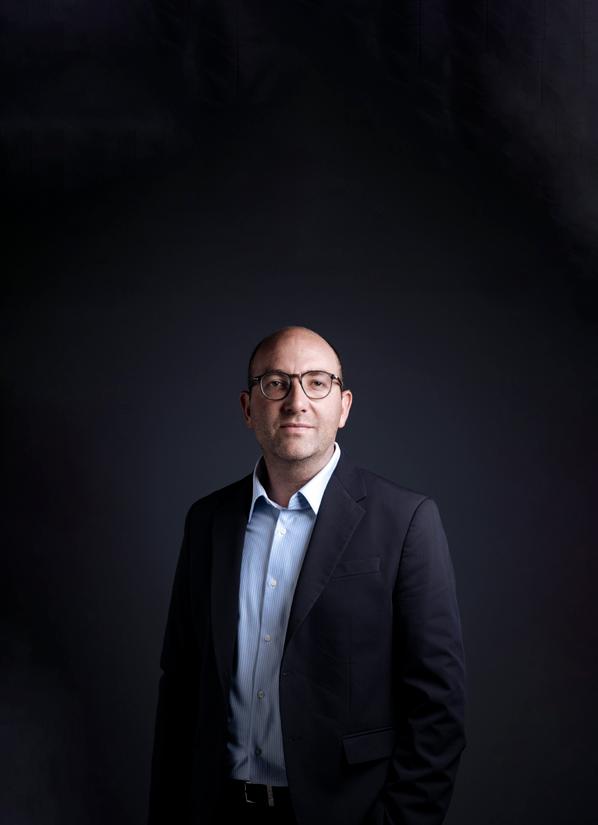
Soft2Bet Chief Product Officer YOEL ZUCKERBERG explains how the company’s B2C launch of ToonieBet in Ontario sets a new benchmark for how global iGaming operators can expand through local-first brands
As the iGaming industry grows across regulated North American markets, localisation remains one of the most important factors for long-term success. At Soft2Bet, we use our B2C brands to test and refine the strategies that power our B2B offering. Each brand launch allows us to validate our platform, optimise the user experience, and align our operations with local regulatory requirements.
ToonieBet, our first Canada-facing brand, reflects this approach. The Ontario market is highly competitive, with many global operators already present. To stand out, we focused on delivering a high-quality product tailored to local expectations. We ensured strong game variety, fast withdrawals, reliable payment methods like Interac, and mobile apps for both iOS and Android. On top of this foundation, we introduced a robust gamification layer, allowing players to take part in challenges, tournaments, and reward-based features like our coin shop and collection system.
Localisation was applied across all elements of the brand. The design and overall tone were built to resonate with Canadian players. Our collection features Canadian animals, sports and landmarks. We also maintain a strong focus on responsible gambling to ensure player safety across the platform.
Soft2Bet’s localisation strategy can be seen in several core areas including visual branding, tone of voice, personalised user flows, and most notably, partnerships with key and iconic Canadian sports entities.
In its first few months on the market, ToonieBet launched major campaigns in partnership with the National Hockey League’s Ottawa Senators and the Canadian Football League (CFL). These partnerships were designed to build brand visibility and establish credibility with Canadian audiences.
With the Ottawa Senators, ToonieBet executed its first major regional campaign that generated more than eight million social media engagements. This partnership includes branded in-arena activations, digital placements across multiple channels and platforms, a fan contest called “Sens Slots” which has generated hundreds of thousands of impressions and accumulated over 4,000 entries, as well as 500 arenabased brand exposures.
Meanwhile, ToonieBet’s partnership with the CFL has provided deeper positioning with Ontario players as the Official Gaming Operator and sponsor of key CFL properties such as CFL Fantasy and Rivalry Games.
At Soft2Bet, we use our B2C brands to test and refine the strategies that power our B2B offering
“
“Soft2Bet is planting long-term roots in Canada that reflect our passion, pride, and purpose

In addition to these key integrations, ToonieBet also implemented live odds integrations on both CFL.ca and LCF.ca, offering Canadian sports fans a real-time betting experience connected to official content.
The results from this partnership have been nothing short of fantastic, as our data has shown a 63% increase in SEO traffic and a 3.2x increase in aided brand recall.
Beyond its strategic partnerships, Soft2Bet technical foundation is just as localised as its marketing. Our proprietary platform combines compliance-first architecture with a customisable frontend optimised for Canadian preferences.
The brand features MEGA, our gamification engine, which allows for mission-based engagement, loyalty mechanics, and a player-facing rewards shop. These features have contributed to a reported 85 per cent engagement rate among active users according to Soft2Bet data.
Beyond gamification, Soft2Bet has invested in CRM-triggered personalisation, responsible gambling tools, and KYC systems that meet and exceed Ontario’s regulatory standards. Just as we’ve done before in Denmark, Romania, and other European markets, Soft2Bet is planting long-term roots in Canada that reflect our passion, pride, and purpose.
At Soft2Bet, every market entry begins with a strong commitment to localisation. From product development and design to partnerships and compliance, we build each brand to reflect the values, preferences, and expectations of the local audience. This approach has shaped ToonieBet’s growth in Ontario and will help us in the future. Localisation is a core part of how we scale. By leading with regional insight and tailored experiences, Soft2Bet builds lasting connections with players and creates a platform that adapts and performs across diverse regulatory environments.




Following Greentube’s recent entry into Philadelphia and Delaware, SBC Leaders caught up with Chief Product and Revenue Officer MICHAEL BAUER to discuss how to tackle the complex regulatory landscape in one of the world’s most competitive markets
How does entering Pennsylvania and Delaware align with Greentube’s goal to secure a 5 per cent market share in the US, and how close are you to achieving this goal?
Our ambition to secure a 5 per cent market share in the US is a mid-to-long-term objective, and our recent entries into Pennsylvania and Delaware are critical milestones on that journey. From the outset, we understood that to make meaningful progress, we needed to be present in all key regulated states. That’s why entering these states was such a key objective for us.
Now that we’re live in all our target jurisdictions, our focus has shifted to deepening our presence. That means growing our market share, increasing brand visibility, and most importantly, delivering the right
content to the right players. We’re confident that with our localised approach and strong operator partnerships, we’re on the right trajectory.
You’ve said before that US players gravitate towards recognisable land-based games. Why do you think this is the case, and how does Greentube tap into these preferences?
There’s a deep cultural connection between American players and land-based gaming. The legacy of iconic destinations like Las Vegas, combined with decades of exposure to physical slot machines, has created a strong sense of familiarity and trust in certain game formats and brands.
This is something we understand, respect, and embrace, which is why our US studio places a lot of
importance on analysing landbased trends. By this, I mean going to casinos, researching trends, checking out the content and seeing how this can be translated into the online sphere.
Thanks to our heritage with NOVOMATIC, we already have a strong foundation in land-based content, and we’re now tailoring that expertise specifically for the US online market.
Operators across the region tend to carry very similar content portfolios. How can Greentube differentiate itself from the masses in North America, and what benefit does that offer operators?
Content saturation is a real issue in North America. Many operators are offering similar portfolios, which makes it difficult to stand out. That’s where Greentube comes in.
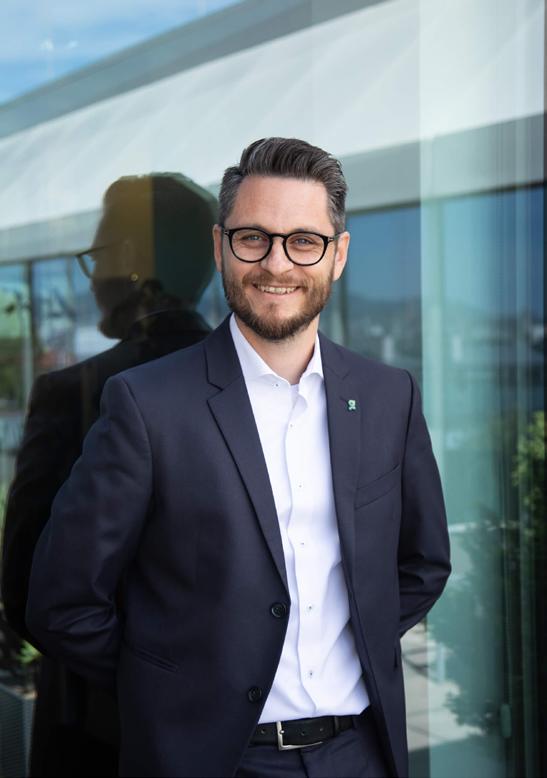
“ When the next wave of regulation comes, we’ll be ready to move
“Content saturation is a real issue in North America. We differentiate through bespoke, localised content that’s designed specifically for North American players
We differentiate through bespoke, localised content that’s designed specifically for North American players. Whether it’s adapting proven land-based titles or developing new mechanics based on regional preferences, our goal is to offer something truly unique. For operators, this means they can deliver a more compelling experience to their players— and ultimately drive better engagement and retention.
There are currently seven US iGaming states. How optimistic are you that this number will increase in the coming years, and how does Greentube prepare for emerging markets?
It’s very difficult to predict. Of course, we’d love to see more markets open up. Our approach is to stay prepared. The experience we gained during our Pennsylvania launch— particularly around compliance and technical readiness—has been invaluable. We’ve built scalable systems and agile teams that can respond quickly to new opportunities. When the next wave of regulation comes, we’ll be ready to move.
Shifting focus to Canada, can you talk to me about the opportunity that Alberta’s regulated market holds?
Alberta represents a significant and exciting opportunity for Greentube as it transitions toward a regulated iGaming
environment. The province is laying the groundwork for a competitive and well-regulated market, similar to what we’ve seen in Ontario.
Alberta offers a fresh opportunity to introduce our portfolio to a digitally engaged audience. We’re particularly enthusiastic about the potential to bring localised, high-quality content to a market that’s just beginning to open up. It’s a chance to establish ourselves early and build meaningful relationships with both players and partners.
How do you think the synergies with Ontario will help the growth of the Alberta market?
Ontario has already proven that a competitive, regulated iGaming model can thrive in Canada. By adopting a similar dual-agency structure and licensing process, Alberta is effectively lowering the barrier to entry for experienced operators who are already active in Ontario.
For Greentube, this means we can leverage our existing compliance infrastructure, technical integrations, and market insights to accelerate our go-to-market strategy in Alberta. The familiarity of the regulatory environment allows us to focus more on localisation and player engagement rather than navigating an entirely new system.
Greentube US is based in Las Vegas. How does having boots on the ground allow Greentube to stay attuned with the needs of players?
Being based in Las Vegas gives us a unique advantage. This is a relationship-driven industry, and having our teams on the ground –across game development, sales, and operations –means we’re constantly in tune with the market.
We’re able to meet with partners face-to-face, attend industry events, and observe player behaviour in real time. Our presence here allows us to be proactive, agile, and deeply connected to the evolving needs of the market.
What are some of the trends that you believe will come to the fore in the North American market in the next 12 months?
We expect to see continued momentum around iGaming regulation, with more states exploring the benefits of opening their markets. This will be a key driver of growth in 2026 and beyond.
At the same time, mobile-first experiences will become even more critical. Younger, techsavvy players expect seamless, high-performance gaming across devices, and we’re well-positioned to meet that demand.




Chief Commercial Officer YURIY MURATOV describes the culture and strategy of fastevolving games provider 3 Oaks Gaming
Hi Yuriy, tell us briefly what drove your entry into gaming and what led you to 3 Oaks?
I came from a financial and analytical background, business modelling, audits, fintech, investment strategy. So naturally, I approached iGaming through structure, not hype. For me, it’s never been just about networking or loud exposure, it’s about solving real commercial and product puzzles and making things work. 3 Oaks offered the rare opportunity to shape a company’s direction from the ground up, from building systems and teams to driving accountability at every level. We’ve created an environment where everyone, whether junior or highly-experienced, can find purpose, continue learning, and gain momentum in their careers. That’s something I’m very proud of as a leader.
What sets 3 Oaks apart from others you’ve worked with, and why does it excite you?
From top to bottom, this is a company that moves with intention. People here aren’t just clocking in, they’re building something they believe in, and that energy is contagious. We’re not here simply to compete on volume or follow trends, our focus is on creating content that feels fresh and authentic, and cultivating a company culture that reflects those same values. As a leader, it’s rewarding to work with people who are as invested in the vision as I am. It’s that shared purpose that sets 3 Oaks apart.
What was once a small setup has become a revitalised, mission-driven department “
“
Each new market must make strategic sense. Flooding into every jurisdiction at once leads to overworked teams, diluted focus, and a product struggling to keep up with certifications
You’re entering new regulated markets. Can you share which ones and how this aligns with your growth vision?
We don’t pursue expansion simply for the sake of putting flags on a map. Each new market must make strategic sense for us. Flooding into every jurisdiction at once leads to overworked teams, diluted focus, and a product struggling to keep up with certifications.
Our recent market entries – Italy, Romania, South Africa, Portugal, Brazil and the UK – demonstrate precision and careful planning rather than haste. Next, we’re preparing for expansion into Greece, Peru, the Netherlands and Spain. Each of these markets will get the attention it deserves because, ultimately, sustainable growth is built on focus, not speed.
Looking back at your time here, what leadership decisions or projects from the past two years stand out?
Structuring our core functions –Compliance, Legal (including AML) and Sales – into a truly global-facing business was a major turning point. On the product side, one of the biggest challenges was transforming how Tech and Compliance collaborate: from lab integrations to evolving project management and scaling for regulatory requirements, we’ve rebuilt how teams align under pressure. These weren’t just operational wins, they were cultural
milestones that set the tone for how we want to do business going forward.
How is your leadership team evolving? What additions or new roles strengthen your regulated market strategy?
We’ve restructured the entire commercial function to reflect the complexities of the modern iGaming market, with Federico Miele leading Regulated Markets, Henrique De Simoni focusing on LATAM, and Yevhen Smyrnov driving RoW expansion. On the Sales side, this year marked a full reboot. What was once a small setup has become a revitalised, mission-driven department. Under the leadership of Krasimir Pankovski, who’s shown incredible resilience and clarity, we’ve now brought in Emilia Kazberuk, Luca Ritcher and Ana Lucaroni. With a dedicated onboarding function in place, we’re building not just for today, but for long-term success in every market we serve.
Looking ahead, where do you see 3 Oaks in three years amid a shifting iGaming world?
We’re not chasing stars, we’re building grounded, meaningful market share in every region we enter. Our goal is simple: if someone opens a casino in Brazil, Spain, or South Africa, they will find our games there and they’ll know exactly what makes them different. We believe in what we create, and we want the world to experience it.



Vegangster Chief Product Officer MICHAEL OZIRANSKY says personalisation is great but finding your preferred content can be overwhelming. As operators continuously look for the right partners, picking the right one can be equally challenging. Oziransky hopes its social media inspired feature Scroll & Play could be the answer
What are the biggest challenges in the iGaming market right now?
The biggest challenge today is around the variety of tools and options for operators. New ones can get overwhelmed by the hundreds of platforms available, which look really similar.
More experienced ones are likely after a specific tool, but they also need to assess the best solution in terms of time to market, less integrations required, or setup time.
We are working to provide different types of operators with a solution that contains everything they need to start or improve their business.
Of course, if they need a specific ecosystem, we have several integrations and external tools that we work with, but

most solutions are already available on the platform.
Automation is also very important. We work with small teams that cover as many processes as possible through smart segmentation, customization of the platform and a lot of operational know-how.
How can an operator stand out from the competition in such a crowded segment?
We are trying to allow operators a better experience around content discovery to stand out – there’s a lot of games to browse through and that is something we are working on. Also keep the focus on the in-game experience: which communications does the player get and interact with, and what type of gamification they have, on top of the game itself.
“
We approached this using mechanics that we are familiar with today through the feeds of social media apps
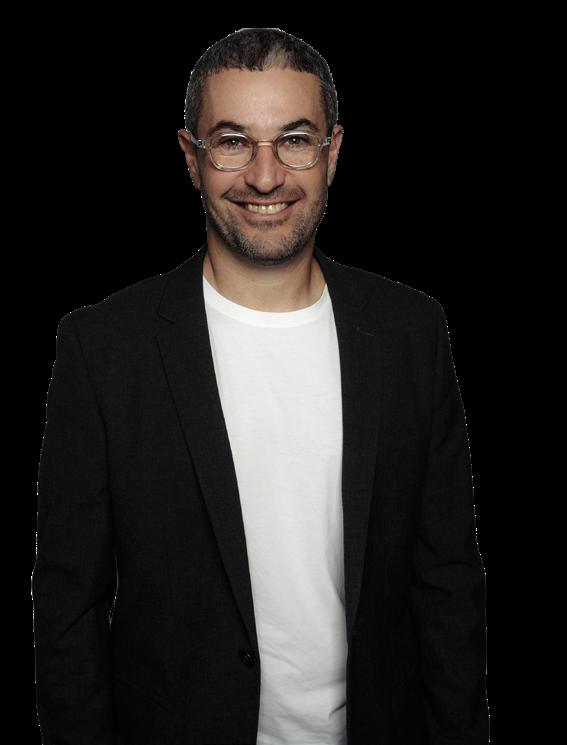
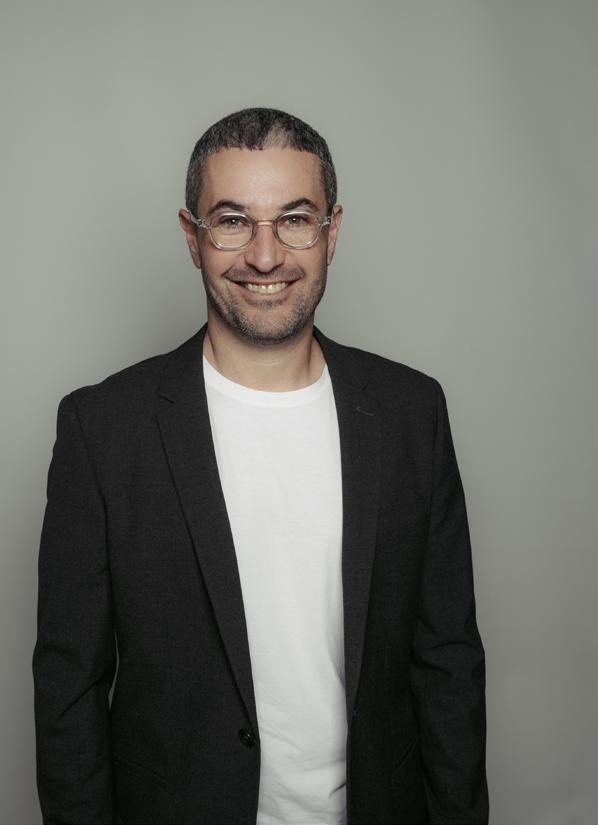

“We have received very positive feedback about it and some operators are even considering building their whole brand around this concept
On the operational side, allowing smaller teams to do more work in the back-office is an advantage that can allow operators to spend less and achieve more through automation.
And of course information to make decisions – having a robust data warehouse to collect it, the ability to stream it outside the platform through more analytic systems, to create insights of player groups, configure campaigns and customer journeys on segments and models is also an advantage for operators.
Vegangster has come up with a different UX approach in the online casino vertical. Can you elaborate on how Scroll & Play works and what advantages it brings?
There are two types of players: one that is a gaming veteran and has around 10 favourite games that they already know they want to play, and what the content is like. The other one is less experienced, looking to explore the library and build their favourite list. That is the target audience for the Scroll & Play feature. In addition, the younger generation that might not be attached to a specific content, and not stay on the same game for long, but would rather scroll and explore what options there are in general.
We approached this using mechanics that we are familiar with today through the feeds of social media apps. It is a very similar interface that allows scrolling through video or still content that shows gameplay and is linked to each game.
It can be connected with gamification events on the website, as you can be scrolling and get an internal advert for a tournament, lotteries, or contests. Operators can choose what to show and link everything on the slide, potentially achieving higher opening rates.
We are also working on an experience that allows players to scroll through standard games and also recommended content that they can save for later. That way they can accumulate the titles they
were interested in and scroll through them later.
How long does it take for the feature to be integrated and how customizable is it?
Integration takes only a couple of minutes for our customers. The backend is also very flexible, so everything is configurable and companies have a lot of control over the process.
We have received very positive feedback about it and some operators are even considering building their whole brand around this concept.
What is the thinking process behind this approach like and how different is it from the traditional experience?
We scroll. You want to scroll on any app you use. Not only on social media but on every other platform. And everything we build is optimized, not for you to stay forever inside the feed, but to help you find as diverse content as possible. Our goal is that players play the games.
A different kind of in-game discovery experience is something that will continue to take over the segment. There is a lot of work to be done on the game experience and there are many options to consider. Casino activity is quite personal, and not as social as other verticals. Still, some variation of P2P options may be interesting in the future.
Do you think online casino gaming may eventually shift in this direction?
There’s two ways to look into it: for now, most operators may see it as a complimentary feature to the classic casino lobby.
There is still time before we see websites adopt this model. For now, more adventurous operators might choose to have it as a home page, and more conservative might want to keep it on a separate tab within their website.



The future of payments isn’t cards or crypto - it’s invisible, writes Payment Expert Editor Rachael Kennedy

The best payments are the ones we forget.
Think about the last time you took an Uber. You got in, got out, and went on with your day. No fumbling with cards, no tapping, no face ID. That is what invisible payments look like; no friction, no fanfare, just function.
Amazon and Klarna are pushing in the same direction. In Amazon Go stores, there are no tills. You walk in, pick up your items, and leave. Computer vision tracks your selections while sensors monitor your movements, creating an experience that feels almost like something out of a sci-fi film. Klarna lets users delay payment with a single tap, altering the traditional checkout anxiety into a moment of relief. In both cases, the payment becomes a background task - something that happens to you rather than something you actively perform.
So should invisibility for payments be the goal?.
Shailesh Kotwal, vice chair at US Bank, recently said, “The next great evolution will see payments fully disappear into simplified,
holistic commerce platforms.” When payments become invisible, experiences improve and conversion increases.
Roughly 9 in 10 consumers in both the US and Europe report having made some form of digital payment over the past year, with the US reaching a new high at 92 per cent, so the demand for digital is there.
But creating this kind of flow takes more than user design. The technical architecture required for invisible payments is complex, involving real-time fraud detection, instant settlement networks, and predictive authorisation systems.
Stripe’s success has come from giving developers a way to build payments into products without rebuilding the engine every time.
But Klarna’s CEO, Sebastian Siemiatkowski, has called most open banking APIs “broken” because they add steps instead of removing them.
Then there’s regulation which demands strong authentication, and users want confirmation for high-value purchases. The EU’s PSD2 directive requires explicit consent for transactions over €30, creating inevitable friction points. Not to mention when something goes wrong, a payment that was too invisible can become a problem to trace.
There’s also the issue of cultural fit. Biometric payments might be normalised in parts of Asia, but adoption varies significantly elsewhere.
Nevertheless, there are clear signs momentum behind these payments is building. Expedia now embeds payments within its travel booking process. So instead of booking a hotel, you get flexible deposits, instant refunds, and a single source of truth. All of it is built in whereas before it felt bolted on.
Right now, invisible payments work best for low-friction moments: rides, snacks, subscriptions. The challenge is extending this same ease to more complex interactions, like deposits, withdrawals, refunds, instalments. These are the moments which still trigger cognitive friction, where users want control and clarity.
Invisible payments are already here, just not everywhere. So the question then becomes whether we can build for invisibility without losing visibility where it matters.
What happens when the payment process becomes so seamless that we forget it’s even there? And what might we risk losing in the name of convenience?

Scan here for more from Payment Expert
Stablecoin adoption remains under 1 per cent but behind a developing infrastructure and increased regulatory scrutiny lies a financial tug of war between private innovation and public control. Payment Expert Editor Rachael Kennedy reports
Stablecoins may have processed over $7tn in transactions last year, but according to global payouts platform Remote and payments giant Stripe, their actual usage among businesses remains under 1 per cent. At first glance, this appears to be a contradiction. Why is so much money and infrastructure flowing into a product with such low adoption?
Behind the headline figures lies a different story: stablecoins are quietly becoming indispensable for specific segments of the global economy. And so the question is no longer whether they work but whether they can scale, securely and compliantly, beyond the current niche.
In regions where local currencies are volatile, infrastructure is patchy, and access to US dollars is limited, stablecoins are finding real, if quiet, traction.
Remote, a Dutch-headquartered payroll platform, now enables contractors in countries such as Argentina, Nigeria, and the Philippines to receive payments in USD Coin (USDC). Its CEO Job van der Voort says that for many workers, “it’s actually amazing to use stablecoins”, describing it as a first step toward broader digital finance inclusion.
Visa is also pushing boundaries in Africa through its partnership with crypto-native fintech Yellow Card. The collaboration allows USDC to be used for cross-border merchant payments in 30 countries; a way to bypass slow, dollar-reliant correspondent banking. Yellow Card now claims to handle around 90 per cent of its operations through stablecoins.
Stripe, meanwhile, has made a billion-dollar bet on this frontier. With the acquisition of Bridge, a stablecoin infrastructure firm, it now offers multi-currency wallets, instant settlements, and even USDC-backed Visa cards for businesses in emerging markets. The promise is programmable dollars that can move 24/7, settle in seconds, and reach places that traditional rails overlook.
As digital trade becomes increasingly borderless, stablecoins are starting to meet users where the banking system cannot.
Despite compelling use cases, the vast majority of businesses and consumers remain on the sidelines. “Adoption is still under 1 per cent, but growing fast,” notes Stripe’s Head of Money as a Service (MaaS) Neetika Bansa. Remote’s CEO Van der Voort uses the same figure for global contractor payouts suggesting that while the tech works, usage is still very much at the experimental stage.
There are several reasons. First, the average consumer has limited access to stablecoins without venturing through crypto exchanges, which can be off-putting. For businesses, integrating stablecoin infrastructure still requires legal due diligence, custody considerations, and local compliance signoff. Not all stablecoins are created equal, and questions persist around transparency, auditability, and redemption guarantees.
Moreover, regulatory uncertainty, particularly in the UK and US, continues to cause hesitation. Without consistent standards across borders, financial institutions are reluctant to scale products that could be deemed non-compliant in key markets overnight.
While end-user adoption may be slow, the infrastructure surrounding stablecoins is anything but. Behind the scenes, a growing number of providers are embedding stablecoin functionality into business payment stacks, particularly for B2B, treasury and platform use cases.
Stripe’s Bridge platform now supports stablecoin-backed card issuance across 12 countries via a single API. The company also facilitates stablecoin settlements for online marketplaces, SaaS platforms and remote payroll operations. According to Bansal, the vision is for stablecoins to become “invisible to the user,” simply powering faster and more flexible money movement.
ECB President Christine Lagarde told lawmakers that stablecoins pose risks to monetary policy, financial stability, and public trust “
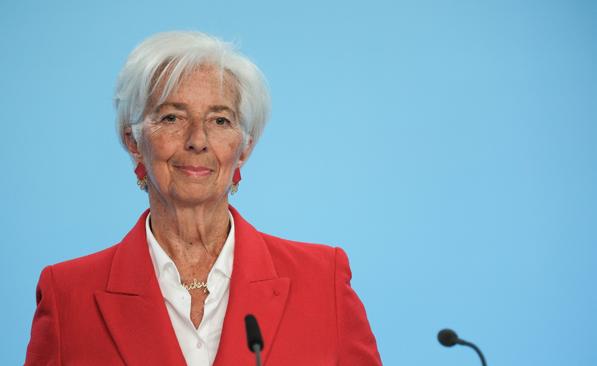
Visa and Mastercard are both running stablecoin pilots, with Visa notably supporting USDC for on-chain settlement in partnership with Circle. Fireblocks, a leading custody and payments infrastructure provider, claims that a growing share of its B2B clients are settling global treasury flows via stablecoins, citing use cases such as SpaceX, which reportedly uses stablecoins to manage revenues from its Starlink satellite broadband service in Argentina and other high-inflation economies.
According to recent data, monthly stablecoin transaction volumes now exceed $700bn. While not all of this volume translates into commercial utility, the direction of travel is clear: major financial players are preparing for a future in which digital dollars circulate as freely as physical ones.
The stablecoin ecosystem’s legitimacy increasingly depends on regulatory clarity and 2025 has already delivered several landmark developments.
In the UK, the Financial Conduct Authority (FCA) released proposed rules in May, covering issuance, custody, and redemption. Issuers will need to meet capital thresholds and guarantee one-to-one redemption in fiat. The FCA also
confirmed that only stablecoins pegged to fiat and backed by high-quality liquid assets will be permitted for use in payment systems. Industry groups have cautiously welcomed the proposals, citing long-awaited clarity as a critical step toward broader adoption.
Across the Channel, the EU’s Markets in Crypto-Assets (MiCA) regulation is now in force, establishing one of the most comprehensive frameworks globally. MiCA includes strict disclosure and reserve requirements for stablecoins, particularly those designated as “significant”.
The framework is already being put to the test. In July, AllUnity became the first issuer to receive approval from Germany’s BaFin under MiCA to launch EURAU, a euro-backed stablecoin. Jointly developed by DWS, Flow Traders and Galaxy, EURAU is fully collateralised and designed to offer 24/7 euro liquidity for institutional-grade crossborder settlements. The move is widely seen as a proof-of-concept for how compliant stablecoins can operate within — rather than outside — the European financial system.
Meanwhile, the European Central Bank has escalated its response. ECB President Christine Lagarde told lawmakers that stablecoins pose risks to monetary policy, financial stability, and

public trust. She singled out Tether for its lack of oversight, and warned of stablecoins’ potential to draw deposits away from the banking system, undermining interest rate transmission.
The Bank for International Settlements (BIS) echoed her concerns, warning that most stablecoins fail the fundamental tests of monetary integrity, including singleness, elasticity and AML compliance. In its recent report, the BIS cast doubt on their long-term suitability as instruments of value or exchange.
To address these challenges, the ECB has launched two infrastructure pilots - Pontes and Appia - aimed at enabling settlement of DLT transactions in central bank money. Pontes will link DLT platforms to existing infrastructure, while Appia will build a native, long-term DLT settlement ecosystem for Europe. Both are part of a broader effort to futureproof monetary sovereignty through programmable, public money.
For all the infrastructure momentum, criticism remains sharp. Nobel laureate Paul Krugman has been among the most vocal detractors. In a recent blog post, he warned stablecoins offer “nothing you can do more cheaply and easily” than existing digital tools, condemning

their anonymity and alleging that “the only economic reason for stablecoins is to facilitate criminal activity”.
Central banks, particularly in Brazil and South Korea, have also issued caution. Brazil’s deputy governor, Renato Gomes, said stablecoins are “stoking volatility in capital flows”, with dollarbacked tokens now representing about 90 per cent of crypto activity in the country. South Korea’s central bank governor, Rhee Chang-yong, voiced concerns that won-based tokens could undermine foreign exchange stability.
And from a macro-prudential angle, the BIS warns that concentrated reserve holdings by stablecoin issuers could impair central banks’ control over interest rates and liquidity . Its latest report adds that the lack of robust AML/KYC controls makes stablecoins attractive for illicit finance, particularly those issued or transacted through decentralised, unhosted wallets.
As regulatory lines sharpen and infrastructure deepens, the battle over digital money is becoming a question of trust.
Will programmable payments be governed by public institutions or left to private actors? And is coexistence – through compliant stablecoins like EURAU or public-private settlement platforms – the realistic middle ground?
Payhound Managing Director ELTON DIMECH takes an in-depth look at the future of crypto payments and stablecoins and predicts a hybrid model where crypto and traditional payment methods work side by side
Crypto in iGaming has shifted to a very different stage from where it began. What started as a way to accept Bitcoin deposits has developed into a broader conversation about how the industry manages money across markets. It is now about creating faster, more transparent and more resilient ways to move value between operators, partners and jurisdictions without adding unnecessary complexity or risk.
At Payhound we have seen this shift take shape over the past few years. Crypto in iGaming has evolved from being driven by curiosity or market trends, to becoming a practical way for operators to optimise core business processes and improve the movement of value across their operations. They want to improve the efficiency of partner payments, simplify the management of funds across regions, and gain greater clarity in reconciliation while reducing manual work and unnecessary costs.
The focus is on solutions that integrate into existing operations and remain secure and easy to use for the people interacting with them.
Has regulation brought in confidence?
Regulation has reshaped the trajectory of crypto in Europe, giving operators the clarity needed to integrate digital assets with confidence. The EU’s Markets in
Crypto Assets framework sets defined requirements for Crypto Asset Service Providers (CASP), ensuring they operate under proper licences, maintain strong compliance systems and meet strict audit and reporting obligations.
Malta’s Virtual Financial Assets Act, which in many ways laid the groundwork that MiCA later followed, gave early adopters like Payhound a recognised framework to operate within. Payhound has been licensed under the VFA for several years, positioning the company ahead of the broader EU regulatory rollout.
For iGaming companies, this shift is significant. Working with a licensed CASP removes the uncertainty that previously surrounded digital settlement. Operators can now integrate crypto into their financial workflows knowing it meets the same compliance and reporting standards as any other regulated financial service. It also means they can demonstrate to partners, affiliates and regulators that their payment processes are secure, transparent and fully accountable.
The earliest use of crypto in iGaming focused on players. Bitcoin and Ethereum deposits attracted attention but did little to change how operators managed their financial operations.
Digital settlement is reaching the same level of reliability as existing card networks, while offering lower costs, greater transparency and faster settlement times

“

Proud Sponsor of SBC Summit 2025
Achieve multiple 100% increases in engagement with our Foundation AI/ML suite
We provide massive growth to gaming operations worldwide through precisely tailored decision-making modules, using the latest technologies in AI, ML and Agentic Workflow Automation.
For CEOs, CMOs, CPOs: We create supercharged results with reduced team strain while avoiding vendor lock-in – built for operational dominance.
For CRM/Engagement/Loyalty Executives: From in-house CRM to 3rd party systems – boost performance with zero operational friction and absolute precision.
hello@goldenwhale.com


Book a demo now!









































The real shift is happening with affiliates who operate across multiple markets and are increasingly seeking faster and more efficient settlements. Traditional bank transfers are slow and expensive, making crypto payments, especially the use of stablecoins a practical alternative.
Suppliers and content providers are beginning to adopt similar methods. Invoicing and settling in crypto, helps avoid delays caused by currency conversions and makes reconciliation more straightforward. Finance teams are also exploring digital asset settlement to reduce the complexity of managing liquidity across multiple jurisdictions.
These improvements may not be visible to players, but they are changing how operators move value through their businesses.
Volatility made many finance teams cautious about using crypto. Stablecoins have removed that barrier by combining the speed and efficiency of digital settlement with the predictability of fiat currencies. Stablecoins can be viewed as an entry point.
For affiliates, they mean commission payments that are both quick and stable in value. For suppliers, they bring consistency to billing. For operators, they provide faster treasury flows with less reliance on regional banking networks.
Stablecoins are not the entire solution, but they have become the most practical bridge between traditional banking and digital settlement.
Stablecoins make digital settlement compatible with the way regulated businesses already operate. They mitigate volatility while keeping the benefits of speed and transparency.
From faster payments to a competitive market
The move toward digital assets is also reshaping how operators compete. Businesses that adopt more efficient payment systems can scale into new markets more easily and respond to partner demands effectively. Besides having operational gains, it also capitalises on market positioning.
As affiliates and suppliers prefer working with operators who offer seamless settlement, those operators become more attractive within the wider ecosystem. Businesses that manage financial flows with greater precision are also better prepared for regulatory change and for entering new jurisdictions.
Crypto payment networks have expanded beyond small companies, with major institutions like Visa, Mastercard, PayPal and leading banks now integrating stablecoins into their systems.
This shift changes how operators view digital settlement. What was once seen as niche is steadily becoming part of the mainstream financial ecosystem, supported by the same networks that already process traditional payments. As institutional involvement grows, digital settlement is reaching the same level of reliability as existing card networks, while offering lower costs, greater transparency and faster settlement times.
The future of iGaming finance is becoming a hybrid model where crypto and traditional payment methods work side by side. Players will continue using cards and e-wallets, and operators will maintain their relationships with banks, while digital settlement is used for specific areas where it offers clear benefits, such as affiliate payments, supplier invoices and treasury transfers.
Successful operators are taking a measured approach. They
start with one area, assess the results, and then expand where it makes sense. By layering digital settlement into existing systems step by step, they improve efficiency without disrupting the wider operation.
Expectations from partners are already changing. Affiliates increasingly request digital settlement as standard. Suppliers are looking for faster and more predictable invoice payments. Financial teams are under pressure to simplify how they manage multi region liquidity.
With regulation now established, with stablecoins widely accepted and with institutional players integrating digital settlement into traditional networks, the stage is set for broader adoption.
At Payhound, our role is to make that transition as easy as possible. We provide regulated infrastructure that connects directly with operators’ existing systems. We manage the complexity so that it feels simple and transparent.
Crypto in iGaming has moved past the stage of future planning and is now actively enhancing financial operations. When implemented with care, it strengthens trust, improves efficiency and gives operators the freedom to focus on the growth and performance of their core business.
POWERED BY
ON THE FOLLOWING PAGES
112 Feature: Brazil’s marketing restrictions
116 Buyer’s guide: SBC events 2026
When Betfair shuttered its UK and Irish affiliate programs in July, it felt like another hammer blow to the affiliate marketing space, writes Affiliate Leaders Editor Charlie Horner

its relationships with sharper bettors and those looking for good prices, Betfair was once a core part of affiliates’ strategies in the region.
The struggles of affiliate marketing over the last couple of years have been well documented, and I encourage you to read more in Issue Three of Affiliate Leaders, but Betfair pulling the plug on its programme is another setback to a sector plagued by Google updates, the rise of AI and evolving regulations.
For the record, parent company Flutter cited a series of changes to the UK&I market and an increasingly complex regulatory landscape for its decision. That is fair in the post-Gambling Act review age and with potential
tax rises on the way, operational margins are set to be tighter. Costs will have to be cut and that means some will lose out.
But surely Flutter should acknowledge that affiliates have provided a powerful tool for customer acquisition and, crucially, retention for a long time. And it raises questions that affiliates will want answers to.
Firstly, what happens to the rev share deals that affiliates agreed with Betfair for the entire lifetime of the customer’s journey?
Affiliates have put in significant resources in promoting Betfair to both a mass market and a targeted select group of players who deliver long-term LTV for the operator. With Betfair potentially walking away from those agreements, it is understandable why some affiliates feel irked and aggravated by the news. It may be too strong to say that Betfair has “stolen” those players, as some forum users suggest, but the sentiment is certainly valid.
Secondly, the UK is notorious for being one of global iGaming’s most difficult and saturated markets. With increased regulation on the way as well as potential tax hikes, I sympathise with operators who seek to cut costs. But could cutting out
affiliates be a bad move in the long term?
Using traditional brand marketing strategies on social, TV and radio is a powerful move, but all operators are doing the same. A key differentiator is having strong relationships with affiliates with enticing bonus offers for players to come onto the site, have a good experience and, ultimately, stay on site.
Closing down its affiliate program only reduces Betfair’s visibility on high-ranking sites and, despite the affiliate sector’s well-documented struggles it still has close relationships with players in the UK and Ireland.
It remains to be seen whether Betfair’s decision will pay off in the long term, but in the meantime, affiliates must drag their tails from between their legs, evolve and pursue opportunities with operators still receptive to their potential.

Scan here for more from Affiliate Leaders

What does the future hold for a market facing heavy advertising restrictions? That’s the question many in the iGaming industry have been asking in recent weeks. ELISA MARCANTE reports
In May 2025, Brazil’s Federal Senate approved Bill No. 2,985/2023, authored by Senator Styvenson Valentim (then a member of PodemosRN, now with PSDB), which sets restrictions on advertising for sports betting and online gaming. Senator Carlos Portinho (PL-RJ), who served as the bill’s rapporteur, presented an alternative draft and stated that football clubs are becoming “accomplices to an epidemic that is destroying families.”
The proposed measures include:
• A ban on the use of images or participation of active athletes, artists, media personalities, and influencers in gambling advertisements - whether on radio, television, or digital platforms.
• Bans on real-time odds during live sports broadcasts, printed advertisements, and boosted content outside regulated time slots.
• A prohibition of marketing messages that frame betting as a solution to financial problems or a means to personal success.
• A ban on the use of animations, AI-generated characters, and any content aimed at minors.
• A ban on direct outreach without prior user consent.
• Fixed-odds betting ads are restricted in stadiums and sports venues, except when the operator holds naming rights or sponsors team uniformslimited to one per team.
• Retired athletes out of the game for at least five years may appear in ads, as a way to support those facing financial hardship.
While Portinho expressed support for Valentim’s original proposal – which called for a total ban on betting advertisements – he opted for a more balanced approach to avoid legal uncertainty for the sector.
Instead of amending Law No. 13,756/2018, which governs the allocation of betting revenues, the substitute bill amends Law No. 14,790/2023, introducing a framework of specific permissions and prohibitions regarding gambling advertising. As a substitute text, the bill must still undergo a supplementary vote in the Senate committee.
The new advertising restrictions build upon principles already established by Brazil’s National Council for Advertising Self-Regulation (CONAR) in Annex X, which was introduced in early 2024.
While Annex X set out self-regulatory guidelines, such as warnings about gambling risks, age restrictions, and a ban on misleading claims, the new legislative measures go further.
These principles were formally incorporated into binding legal requirements through Ordinance SPA/MF No. 1,231 of July 31st, 2024, which regulates responsible gambling and advertising practices in Brazil’s betting market. The ordinance mandates standardised public health warnings, prohibits ads targeting minors, bans endorsements by athletes and influencers, and imposes strict rules on language, placement, and visibility of gambling content.
It’s difficult to envision a promising future for the sports betting market in light of the recent changes to advertising regulations
“ The recent changes in sports betting advertising were a response to problems that stemmed from a poorly designed regulatory framework
spokesperson emphasises the broader regulatory challenge.
“The segment is challenging due to its volume and complexity,” he notes, highlighting the need to provide consumers with full information, especially regarding the inherent risks of betting.
The CONAR spokesperson highlights the protection of vulnerable groups, particularly children and adolescents, who must not be targeted by gambling advertisements. He points out that existing regulations are already in place and that ongoing efforts aim to promote responsible advertising based on informed consumer decisionmaking. “At this moment of segment novelty, information plays a crucial role,” he adds.
Regarding Bill No. 2,985/23 specifically, CONAR’s represenatative expresses concern about the bill’s feasibility and whether it fully aligns with established regulatory principles.
are positive, even essential, such as the prohibition of materials targeting younger audiences. Yet, he questions rules that outright ban certain practices which, in his opinion, should instead be subject to controlled regulation rather than prohibition.
CONAR’s spokesperson deploys the fact that its Board maintains ongoing dialogue with public authorities and stands ready to support them. At the regulator’s request, all CONAR actions related to the betting segment are communicated to the Secretariat of Prizes and Betting, ensuring coordinated efforts aligned with the regulatory framework.
Annex X served as a regulatory foundation, but the legislation widens its scope. It transforms Annex X into enforceable law and reflects growing alignments towards reducing gambling harms and promoting responsible advertising.
According to Vítor Portella, from Zanella Advogados Associados, the recent changes in sports betting advertising were a response to problems that, in his view, stemmed from a poorly designed regulatory framework. Portella argues that by concentrating oversight in the Ministry of Finance, the government revealed a primary interest in revenue generation and rushed the regulation to capitalise on the market’s rapid growth.
While this perspective raises concerns about the government’s motivations, a CONAR
The council acknowledges that Congress remains open to diverse viewpoints, which is crucial for developing balanced and effective regulation. According to the body, Brazil already has a robust regulatory framework that includes safeguards proven in more experienced international markets, but ongoing improvements continue to be necessary.
Portella adds that, in his view, regulatory oversight should be shared between the Ministries of Finance, Health, and Sports. He believes that if such a joint approach had been adopted, the current sports betting regulation might look different, and the recent advertising rule changes introduced by CONAR in its Annex X might not even be necessary.
That said, Portella considers Annex X insufficient – not due to the number of rules, but because it practically makes the sports betting market unviable. He acknowledges that many provisions in Annex X
Internally, CONAR employs technological tools to monitor social media, which, after human review, feed information to its Ethics Council and Preventive Unit. These bodies notify advertisers, agencies, and influencers when they detect basic non-compliance issues, such as missing warning labels, absence of age restrictions, or advertising that promises guaranteed gains or offers prior bonuses.
Portella says: “It’s difficult to envision a promising future for the sports betting market in light of the recent changes to advertising regulations.”
The lawyer argues that, instead of properly regulating through thorough consultation with market participants, the government has opted for a sweeping ban, unaware that it’s trying to cover the market with a blanket too short.
He warns these prohibitions create major uncertainty for a sector energised by operators’ investments across the sports ecosystem. According to him, the restrictions could sharply reduce betting companies’ revenues, causing significant losses not only for operators but for the entire ecosystem dependent on their income.

Just in time for 2026 budget-planning, here’s your guide to next year’s SBC Summits. Which ones are right for you?

3–5 March 2026, Riocentro | Rio de Janeiro
SBC Summit Rio is the event to attend if you’re looking for a focused, Brazil-specific experience that lets you zoom in on one of the most exciting gaming markets in the world today.
This year’s SBC Summit Rio took place just months after Brazil’s regulation came into effect - a moment of fresh opportunity and speculation. The discussions focused on what might work and how best to navigate this
uncharted landscape. Next year, the tone will shift. We’re no longer hypothesising. We’re assessing. What delivered results? What surprised us? And how do we build on that momentum?
Every licensed operator in Brazil was at the event last year. So if you’re operating in - or supplying operators in - Brazil or even thinking about it, this is a no-brainer.
15,000 DELEGATES
6,000 OPERATORS
1,500 AFFILIATES
400+ EXHIBITORS
250 SPEAKERS
28–30 April 2026, InterContinental | Malta
Rebranded from CasinoBeats Summit to SBC Summit Malta, which means it now serves the entire gaming industry, not just the casino vertical.
Being hosted in Malta makes it a simple destination for the many important companies headquartered locally and is easily accessible from across Europe. It is a more intimate event, which attracts a high percentage of decision-makers,
making it easier to connect with the people you’ve been trying to reach.
There’s also a strong emphasis on hands-on learning. This year alone featured 19 workshops, making it a fantastic opportunity for companies based in Malta to send more of their employees, especially those who are often underrepresented at industry events.
6,000 DELEGATES
2,000 OPERATORS 750 AFFILIATES
75 EXHIBITORS
250 SPEAKERS


19-21 May 2026 | Metro Toronto Convention Centre, Toronto, Canada
Formerly known as the Canadian Gaming Summit, this long-standing event enters its 29th edition in 2026.
The summit remains Canada’s biggest industry event, offering insight into one of the world’s most unique and evolving regulatory landscapes. With a patchwork of provincial regulations and untapped market potential, Canada is a market that demands local knowledge and strategic vision.
While Ontario has dominated headlines, 2025 marked a turning point as Alberta moved closer to launching its own legal market for online sports betting and iGaming.
At SBC Summit Canada, you’ll connect with operators that are live in Ontario, Crown Corporations, and First Nations representatives - and gain the clarity you need through an agenda packed with education-focused panels.

3,000 DELEGATES
1,000 OPERATORS
200 AFFILIATES
75 EXHIBITORS 150 SPEAKERS

8-10 June | Broward County Convention Center, Fort Lauderdale, Florida
2025 marked the debut of SBC Summit Americasthe first event to bring together stakeholders from North, Central, and South America under one roof.
With many brands operating across multiple markets, combining the much-loved SBC Summit North America and SBC Summit Latinoamérica into a single flagship event proved to be a strategic win. It streamlined the calendar for attendees, offering more value through a single, comprehensive experience.
In 2025, we elevated the event’s impact by integrating two other powerhouse SummitsAffiliate Leaders Summit and Payment Expert Summit - adding depth, focus, and broader relevance to the programme.
Looking ahead to 2026, SBC Summit Americas will double down on this bold new concept, further strengthening cross-regional collaboration and ensuring that the Americas remain front and centre in the global betting and iGaming conversation.
10,000 DELEGATES
4,000 OPERATORS 1,000 AFFILIATES
400 EXHIBITORS
400 SPEAKERS

29th Sept - 1st Oct | Feira Internacional de Lisboa, Lisbon, Portugal
If there’s one event to circle on your calendar, it’s SBC Summit - our flagship global gathering that brings the entire sports betting and iGaming industry under one roof.
Why attend? Held in late September, it offers a strategic end-of-year touchpoint, perfect for product launches, partnership deals, and market exploration. Everyone will be here. From operators and suppliers to regulators and media, it’s the most complete room you’ll find all year. It’s an efficient, ROI-focused
environment where high-level networking and spontaneous opportunities go hand in hand.
And while the scale is impressive and the speaker lineup always top-notch, the real magic of the event lies in the fact that it’s one of the few events that delivers both serious business and a great experience.
There’s a reason we call it the “Greatest Show in Gaming,” and that’s why the industry keeps coming back.

40,000 DELEGATES
9,000 OPERATORS
5,000 AFFILIATES
750 EXHIBITORS 600 SPEAKERS

October 2026 | Sheraton Grand Tbilisi Metechi Palace, Tbilisi, Georgia
SBC Summit Tbilisi is the place to go when you’re serious about cracking the markets of Eastern Europe and Central Asia.
These regions are complex. Regulation is evolving. Cultural nuances matter. And the opportunities are huge, but only if you know where to look and who to speak to. We all know the potential of these markets, but knowing isn’t enough. You need to hear from people living the market every day.
This summit gives you the shortcut. It brings together local regulators, operators who’ve already made it work, affiliates who know how to convert regional players, and suppliers with boots-on-theground experience and real skin in the game.
Another great thing about this event? It’s intimate. You won’t be fighting for attention in a massive crowd. You’ll be sitting across from decision-makers (and maybe even shaking hands on a deal?).
2,500 DELEGATES
800 OPERATORS
250 AFFILIATES
50 EXHIBITORS 60 SPEAKERS
SBC Advisory has teamed up with Optimove Pulse to provide you with a real-time snapshot of some of the industry’s most important metrics. Anton Kaszubowski takes a look at what the data reveals about some of the most exciting growth markets for iGaming
As online gambling markets across Eastern Europe continue their rapid evolution, July’s player behaviour statistics reveal fascinating contrasts in bettor engagement, spend, and retention.
Georgia’s high-spend, highretention paradox
Perhaps the most striking market is Georgia. Despite a modest conversion rate of 48 per cent, it posted one of the highest average revenues per active player (€2,313) and the strongest retention rate in the region at 83 per cent. Even more

Anton
Kaszubowski, is the Founder & Managing Director at SBC Advisory Partners, the global strategy & regulation specialists that advise on a broad range of projects across the international iGaming, sports betting, and sports business industries.
telling, average bet amounts grew by 11.7 per cent month-over-month, and bet days increased by 3.2 per cent. Yet, reactivation remains low at just 1.6 per cent, suggesting a concentrated but loyal base that rarely lapses. Operators should see Georgia as a market where premium acquisition tactics and VIP-focused retention strategies may yield outsized returns.
Hungary: trouble beneath the surface
In contrast, Hungary presents red flags. With the lowest conversion rate of all markets (3 per cent), its retention and reactivation rates (59 per cent and 1.9 per cent, respectively) signal weak engagement across the funnel. Compounding this is a decline in average bet days (-4.4 per cent) and average bet amount (-2.4 per cent), suggesting a pullback from even engaged players. Still, net gaming revenue per active grew by 6.7 per cent, which may point to fewer but higher-value players. For operators, Hungary requires a reassessment of onboarding flows and targeted promotions to boost both acquisition and stickiness.
high conversion, low loyalty
Latvia’s figures tell a cautionary tale: while it boasts the highest conversion rate in the region (68 per cent), both new player retention (30 per cent) and overall retention (66 per cent) trail the pack. This indicates that while
marketing campaigns may be effective in driving sign-ups, the long-term value of these players is in doubt. With average bet growth stagnant (-0.3 per cent) and NGR gains more modest (11.1 per cent), this signals a leaky funnel. Focused CRM and lifecycle management could be key in transforming Latvia’s impressive acquisition into sustainable revenue.
Steady climbers and strategic implications
Elsewhere, markets like Romania, Slovakia and Poland are seeing encouraging signs of balancemoderate conversion rates, stable retention and rising deposit activity. Slovakia, in particular, saw a 15.1 per cent rise in average bet amounts and a 16.9 per cent jump in net gaming revenue per active - figures that suggest growing comfort with digital gambling in previously more cautious markets.
Estonia also deserves a mention, with the second-highest revenue per active (€2,283), a solid conversion rate (54 per cent), and rising average deposits. While its retention figures aren’t the region’s best, it is clearly moving in the right direction.
For operators, July’s data offers one key lesson: regional success will hinge on agility. Understanding what’s driving loyalty in Georgia, or what’s breaking onboarding in Hungary or Latvia, is more than academicit’s actionable.
Optimove iGaming Pulse presents industry trends, benchmarks and Key Performance Indicators (KPIs) from over 300 gaming brands globally. To find out more, visit www.optimove.com/pulse


t’s no secret that the gambling industry operates under more scrutiny than most. Public opinion, political pressures, and regulatory oversight form a constant backdrop to our activities. While our sector provides entertainment, tax revenue, jobs, and technology innovation, it is often painted with a broad and overly negative brush.
There are a couple of ways of dealing with this. One is don’t say anything and just quietly continue with the work. The downside of that is the image of the industry gets worse, recruitment becomes difficult and regulations become punitive.
Another option is to defend ourselves with reactive statements, but that only slows down the degradation of the industry’s reputation rather than improving it.
The third way is a more difficult way, but ultimately more rewarding. We take real ownership of our impact through proactive, visible and authentic corporate social responsibility (CSR).
CSR isn’t just about ticking boxes or running a charity campaign once a year. It’s about aligning our business strategies with a broader sense of purpose. It’s about showing that we care not just about profit, but about people - our players, our employees, and the communities we’re part of.
Let’s start with public perception. Our industry can’t afford to operate in a silo. The wider world is watching, and we must show we’re listening. The more we demonstrate a tangible commitment to responsible gambling, player protection, environmental sustainability, and social contribution, the more we counteract negative narratives and build lasting trust.
Consumers are increasingly values-driven. Regulators and policymakers are under pressure from constituents to ensure the industry is held to high standards. If we want a seat at the table – not just to defend ourselves, but to help shape the future of this sector – we need to prove we take responsibility seriously. That means not only meeting regulatory minimums, but exceeding them where we can.
Beyond the external benefits, embracing CSR has a powerful effect inside the organisation too. Today’s workforce, especially younger generations, want to work for companies that reflect their values. They want to feel like their daily efforts contribute to something meaningful. A strong CSR strategy gives employees a shared purpose. It boosts morale, strengthens retention, and attracts top-tier talent who want more than just a salary.
It is this knowledge that helped us develop the Legends Charity Game this September. We knew the whole gambling industry would be here in Lisbon for the SBC Summit and saw an opportunity for us all to come together to raise a lot of money for a range of good causes. We hope it will be the first of many opportunities for us all to come together in this way.
No single company can transform the industry’s image alone. We need to collaborate – competitors, suppliers, affiliates, operators, and regulators alike – to establish consistent, credible commitments across the board. That means sharing best practices, supporting joint initiatives, and investing collectively in projects that give back to society. That’s also what this week in Lisbon is all about.
Stay cool, Rasmus Sojmark, Founder & CEO, SBC









